#sustainable development conclusion
Explore tagged Tumblr posts
Text
Sustainable Meaning: The Key to a Balanced Future
Outline Heading Sub-Headings Definition of Sustainability Origins of Sustainability, Modern Interpretation, Key Components Environmental Sustainability Importance of Biodiversity, Climate Change Impact, Renewable Energy Economic Sustainability Economic Growth vs. Environmental Preservation, Sustainable Business Practices, Green Economy Social Sustainability Equity and Social Justice,…
#Economic Sustainability#Environmental Sustainability#Social Sustainability#sustainable development#sustainable development 17 goals#sustainable development 3 pillars#sustainable development advantages#sustainable development article#sustainable development assignment#sustainable development assignment pdf#sustainable development benefits#sustainable development books#sustainable development case study#sustainable development challenges#sustainable development chart#sustainable development class 10#sustainable development class 10 project#sustainable development class 12#sustainable development class 8#sustainable development conclusion#sustainable development cover page#sustainable development definition#sustainable development definition class 10#sustainable development diagram#sustainable development disadvantages#sustainable development drawing#sustainable development drawing for project#sustainable development economics#sustainable development environmental law#sustainable development essay
0 notes
Text
Dragon Age Veilguard: Love, Wisdom and Pride
A very long Dragon Age post!
Warnings for: Veilguard Spoilers, Solavellan spoilers.


Okay, so I will preface this by saying that this ‘analysis’ primarily focuses on Solas’ arc; both romanced and unromanced. It isn’t intended to be a romanticised analysis, though it is very much enamoured with how a romanced Solas and his relationship with Lavellan foils (and informs my reading/reception of) that of Solas and Mythal’s relationship in Veilguard. There is a relationship I will address that I feel does parallel Solas and Mythal! Scroll down to “Reading Between the Lines” if you wanna skip my little intro below. Spoilers follow.
Truth be told, I wasn’t ever expecting much in terms of actually getting a sequel to Inquisition. The game dev market went through a tumultuous reshuffle before the remake madness breathed life back into many studios. Bioware game sequels (Mass Effect Andromeda) were underwhelming and not as fleshed out since the EA acquisition. I absolutely believe Bioware would have been shunted had Mass Effect Legendary Edition not been so successful. EA’s reputation was always lacklustre and underhanded, but laying off or losing several head writers attached to Bioware with almost two decades of work under their belts was the biggest red flag. Trevor Morris not being asked to return in exchange for a ‘bigger name’ was also a grave warning that returning to the atmosphere, ambience and world of Thedas that we knew was getting further and further away from a plausible reality. And on top of that, there’s the fact Solas was never intended as a romance interest during early development of Inquisition.
Solavellan seemed doomed!
Despite this, I still held out hope for a sequel, but I feared we’d always be in permanent Solavellan/developmental hell. Heck, I’m still waiting for a Beyond Good and Evil sequel—the game released in 2003! So, actually witnessing people play Veilguard, seeing reactions to it, seeing memes and gifs and essay pieces (like this one), it’s like my community has awoken again, and I never thought I’d see the day. Yet I am not blind to the fact we were robbed of so much potential. I knew thing’s wouldn’t live up to re-emerging expectations when Dragon Age: Dreadwolf was rebranded to Veilguard—the shift seemed to imply less of a primary focus on Solas (and apparently, according to the artbook, the early concept art proves this implication correct).
Things seemed even more dire when the devs revealed there was no tapestry mechanic. I had only one hope: that with the Inquisitor’s confirmed return, we’d get at least some form of catharsis for our Inquisitors (Lavellans and otherwise), if we couldn’t get the conclusions to so many storylines present in each of our worldstates. My main fear was that they’d go the clichéd Ultimate Sacrifice route (which happens anyway, but in a way that makes thematic sense given the stakes and heavily blighted worldstate).
Suffice it to say, there was a lot of evidence that Veilguard would disappoint me in the end. But it hasn’t. It hasn’t lived up to the many expectations and marks of excellence that the Dragon Age world built itself into with the first three entries, that’s for sure, but I am also just so deprived of conclusions, of endings (whether it be because TV doesn’t exist in a sustainable format anymore or that comicbook movies are made with a sequel in mind, never letting anything just “Exit Stage Left” gracefully; or the fact we live in a regurgitating content cycle with late-stage-capitalism where anything remotely profitable gets turned into a caricature of itself: Squid Game, Star Wars, etc.). The cycle is so exhaustive that I am actually at a point where I can say I am content with the ending we were given (on a Solas/Solavellan front), Veilguard gave me relief, and beautiful, achy pain to boot. Though I would absolutely be disappointed by both the "non-romanced Solas" endings, given that Solas winds up either "dying alone, forever" or turns to Tyranny.
Now onto the actual review of that Solavellan ending, Mythal and themes of Love!
Note: I have only gotten the ‘best’ ending in my first playthrough, but I also thought the consequences of not maxing factions would be more… dire? Another note, pls, if your romanced Inky swore to stop Solas, how does that ending differ, if at all? Let me know, I’m dying here!
Sidenote: I’m working on writing another review about my views on the ‘sanitised’ worldstate, the new companions (and why I think Varric was the wrong choice to have as an advisor in the game, given that the Inquisitor or Morrigan would have been more impactful; and not to mention that Cole or Briala should have been companions), removal of the tapestry and what it means for the future of stories in Thedas (The Story We Lost is such a poignant compilation of the sheer volumes of lost lore and depth that I honestly think I won’t go as in-depth on that review as this one), and why I think Veilguard is my final entry into Dragon Age.
Reading Between the Lines: What Pride Hath Wrought
One thing is for sure, Trick Weekes flourishes when writing within the ambiguities and complexities of meaning. This makes every word uttered by Solas so great to dissect, he's a god of lies not because he 'lies' but because he's so careful with how he phrases things, what he holds back, and what he reveals.
For instance, the famous Trespasser exchange where Solas mocks his own follies with sarcasm by saying:
“What is the old Dalish curse? May the Dread Wolf Take you.”
Then a softer, more saddened and beaten-down Lavellan replies:
“And so he did.”
This irks him. Because he then realises in that moment that he absolutely did take advantage, but for some reason he frames it around sex rather than power because that’s easier to address than the latter. And he rejects the notion, even though he brought up the expression he knows to mean nothing close to a sexual inuendo for being ‘taken’, and yet he has the gall to try and derail the conversation by pivoting and saying:
“I would not lay with you under false pretences.”
When I first had this dialogue exchange, I was baffled, because did this mean that there was another meaning to ‘Dread Wolf take you’ that Dalish clans lost through the years, or was it more of a self-deprecating joke Solas had with himself because he, the Dread Wolf, romanced (took) a Dalish Inquisitor (away from her people’s beliefs, histories, past), and he found irony in the saying?
On the surface, “wouldn’t lay with you under false pretences” could simply mean “we didn’t sleep together” or “we did sleep together, but I wasn’t taking advantage as the Dread Wolf, I was simply Solas in your presence”. But I have recently thought of a more… ambiguous reading. Lay could have been used in a milder, more vulnerable way; to mean to be at peace, to be completely vulnerable, as if to sleep. In that sense, the phrasing becomes: “I could not be at peace with you because I was living a half-truth”.
I absolutely think the moment he feels he is truly beyond hope is when we see his expression of abject horror as Lavellan shouts: “I would have had you trust me!”. He realises then that he did fuck up, he did take the choice away from her because he thought he knew better, him and his pride led to a decision that hurt someone close to him, and he could finally see how wrong he was, how alike the entire situation became to Mythal’s treatment of him. Especially if Lavellan asks to go with him. Because he can see that despite the hurt, the lies and the betrayal on his part, Lavellan still wishing to join him draws too close to his first regret: following Mythal.
Whether he likes it or not, Solas’ love which could burn like a bonfire was directed at a powerful woman—a Herald, an Inquisitor—and inspite of her greatness of character, it still shaped her into someone willing to follow him on his dinanshiral out of love, much like he left the Fade and took physical form for Mythal. So now whenever I hear Lavellan shout “Var lath vir suledin”, Solas replying with “I wish it could, Vhenan,” changes drastically with the Mythal reveal, knowing he always walks away from the Inquisitor in Trespasser.
“I wish it could, Vhenan” sounds heavily like: “You would regret me, as I regret Mythal, and I cannot bear for that to happen us.” More poetically, it could read as: “I wish our love could overcome a duty that has lasted an incomprehensible amount of time, I wish I could change my nature, but then I’d be twisted into a demon, like the spirit of Wisdom in the Dales; and yet again, I would become your regret.” These two readings are very, very romantic. Realistically, given what we know of his kinship with Felassan, and how they were comrades and friends for centuries (“A story unfinished. His back turned!”), and given what we know of the complexity of Mythal’s will that presides over the creation of his very being, and yet he was still able to muster the strength to kill a fragment of her to fulfil his mission, “I wish it could” was most probably a lament: “Do not ask me to hurt one of the two women I’ve loved on this journey, because if it ever came to it…” he would.

Knowing what I know of Solas, of how he was able to convince himself that Varric’s death (avoidable as it was) was just another necessary step, that it was just another sacrifice, another loss that would be worth something only if he completed his ritual, I have no doubt that Solas would also be able to rationalise hurting Lavellan (which is why in his mind, turning away from her, breaking her heart, leaving with no explanation and aiding her in Trespasser so she could live whatever few years remained in “relative peace” is actually an act of preserving that love). I partially think the reason he reveals the truth in Trespasser (especially for a romanced Lavellan) is in the hopes his ‘truths’ will push her away. But on a deeper note, I think he also thinks of it as some twisted form of repaying her for loving him to the point that he could have almost forgotten what it was to be the Dread Wolf, to just be with her as Solas, that night at Crestwood. Maybe his harsh truths would push her to the point where she’d give up her love for Solas, now that she knew he was the Dread Wolf, freeing her from the shackles of their love. He’s very self-flagellating, all about self-sacrifice for the ultimate goal, the ends always justify the means, he will endure any pain and punishment as long as Arlathan returns in the end.

What is his love of a mortal compared to the despair and loss of an entire empire? Solas views himself as selfish for falling for her, and that nearly broke him, if he was selfish enough to leave the dream of Arlathan behind for her, what would that do to his spirit then?

In his way of thinking, perhaps telling the Inquisitor the truth is a way out, a rationale they can use to justify stopping him or to make it easier to hate him as the Dread Wolf rather than love him as Solas (someone he hasn’t been in so long).
‘Masking’ as the Dread Wolf
During Trespasser, the Inquisitor has every right to despise Solas after all they’ve learned, and I think he half reveals the truth as a tactic so the Inquisitor can have an excuse to hate him, to be driven to anger and have less pull over his choices, once they learn the truth. Solas is particularly skilled at making other’s play the role that makes his own choices seem inevitable, he orchestrates a lot of events to play out in a manner where it's easier for him to talk himself into bringing down the veil.
He goads Elgar’nan to anger easily. He inspires the spirits to fight for him to the death as a necessary distraction during the war. He absolutely allows the Inquisitor to speak to him one last time so he can offer insight, yes, but also so he can easily frame his actions as just and inevitable. But, Oh boy does he get in for a shock if the Inquisitor shows empathy towards him, it scares him because he’s become accustomed to being seen only as the Dread Wolf. To be understood? That gives way to remorse. And remorse gives way to doubt. And he cannot doubt his purpose, twisted as it is, it is all he has left of his former self. Without it he would most likely change into something different. Someone he doesn’t recognise.
This fear intensifies more so if a romanced Lavellan asks to go with him, and in that case, he takes command and distances himself away (rejecting the help of someone close to him; the chance for a possible betrayal; the chance at another Felassan or Mythal [x]; the chance to twist Lavellan outside of her purpose, in this case, the purpose would be love/empathy) but not without showing remorse at having sacrificed yet another relationship for his crusade.
“Ir abelas.”
Sorrow for what cannot be is at the heart of why the Solavellan romance is so powerful, especially because even though both Solas and Lavellan love each other passionately, love alone cannot be enough when faced with regrets. Love would ultimately be stifled. Corrupted into something else over time. And so, for Solas, having loved and lost tragically is better than having loved and corrupted.
He will not do to Lavellan what was done to him, even if it is her choice, because she knows so little, her naivete cannot close the distance of a millenia’s old sea, and it would hurt him immensely to take advantage of her kind heart [x].
By leaving, he keeps her heart pure. And the yearning! Knowing the love is there, but on its own it cannot be invulnerable to corruption, so it is better to lose it than twist it. Ugh! Him leaving Lavellan is the ultimate show of love! IT IS A WISE DECISION. A rare glimpse into pure wisdom. Which is why he kneels beside Lavellan in Trespasser, he does not “Stand Tall” in the face of Wisdom’s heart. He kneels beside her. And when he stands tall again, he is Solas once more, filled with regret, and once through the eluvian, he returns to masking as the Dread Wolf.
Sidenote: It’s especially confounding that Veilguard allows Rook to push the Inquisitor to save or stop him after you’ve reached act 2 despite your world state choice (I think this was done in case they feared the Inquisitor wouldn’t stand by Solas after everything he was revealed to be responsible for in Veilguard, however it doesn’t work because the Inquisitor wasn’t an advisor, Rook never told them what they learned from the wolf statues, so having a stranger hold the ability to make Lavellan keep her promise or not rings hollow). Personally, I wish the Inquisitor’s presence had more weight in the non-Solavellan endings, too. I wish the Inquisitor could end up being the last friend/former love that Solas destroys (if you don’t collect the wolf statues) which then prompts Rook to fight him because Solas’ last tie to empathy failed to redeem him, that the Inquisitor falling is the last straw and Solas snaps, choosing to be a villain in the hopes of being stopped because he can’t stop himself, and not the ‘I am a God’ ending they gave us. Same for if your Inquisitor vows to stop him. I also wish the Inquisitor was the one to do the wolf statue missions. Would have been a nice secondary protagonist mission like the switching perspectives between Kratos and Atreus in GOW: Ragnarök (the old guard and the new; Inquisitor and Rook). I would have loved if they dedicated more dialogue to Inquisition days too, which is why I think Cole should have been a companion (if he wasn’t recruited, he could simply be a compassion spirit that ‘follows’ the greatest pain in the Fade that yearns to be healed, giving a compassionate viewpoint to Solas’ folly; recruited Spirit Cole could have a greater connection to Solas than even Varric, seeing as Cole was most likely a literal representation of Solas rewriting his own history by preventing a spirit from becoming too ‘real’; Human Cole would have a deeper connection to the world of Thedas, and could have been a great tool to prove how change was inevitable, not always a bad thing, and inevitably out of even Solas’ control. But alas, we live with what we are given! Even Imshael could have served in this role! Spirit/Demon of choice and it wasn’t incorporated into the game that supposedly asks you to make the greatest world-changing choice ever; redeem the Dread Wolf or end the age of the Evanuris entirely?!
Now onto the next segment: I want to talk about Solas’ regrets and how I read the ‘love story’ between Solas and Mythal, and why Lavellan (and what she represented) wasn’t enough to get through to him (and that’s a very believable thing, that’s what makes their love both tragic and epic!).
The High Price of Redemption
A romanced Lavellan has the most agency to see through his guises, if she resolves to save him, but even she cannot undo the shackles that still bind him to Mythal—the binds that twisted Wisdom so far from its purpose it became Pride, even when he burned (Mythal) from his face. (Likewise, A close friend Inquisitor who promises to save him is most likely a parallel to Felassan, again, they cannot undo the shackles of regret either.) I fully believe the vallaslin had a deeper magic than simply marking one as being committed/devoted to an Evanuris, I think it linked them magically, and since Solas was the first to burn the vallaslin away, he probably wasn’t as good at severing the link on himself as he was for other elvhen, so maybe a part of Mythal’s will still lingers in him, twisting him to Pride still.
In Veilguard’s final confrontation, I love the intention of showing how Lavellan approaches Solas slowly, as she doesn’t know who she’ll be faced with up those steps, Dread Wolf or Solas. But when she speaks to him, trying to get him to change his mind yet again, forgiving him for his wrongs, we are reassured that Wisdom hasn’t been completely consumed by Pride despite everything we’ve witnessed in the game because he bows his head at her in reverence as he apologises.

He shows humility towards her. He elevates her and her enduring love as worthy of his respect, be he does not consider himself worthy of hers. Thus, Lavellan pries open the door to acceptance but his heart is still not enough. Which is why love alone cannot turn the tide. He’s too broken to accept it. He doesn’t think he deserves it, so the only way out is through; to continue the ritual, to prove he was right. The shackles persist. Varric’s death weighs on his conscience now more than ever. Possibly members of Rook’s team too if they died on his crusade. But he is vulnerable enough for Morrigan to approach, and now Rook can use Mythal’s essence to make the final push. The only way he could be with Lavellan, the only way he could atone for the past and shed the weight of his armour (his crushing duty to the Elvhenan) is as Wisdom, fully restored, unbound by mistakes.
“Ar lasa mala revas.” He could only find absolution once Mythal (the angered and more brash essence of Mythal, the one unchanged by Flemeth and all the human women’s lives she’s been shaped by, but the closest iteration to that of Mythal in Arlathan, the version that he perceives as having every right to be angry at him for turning his back on her, for not going that last final stretch with her and subsequently, not being by her side when she died) severed the final connection: facing his regrets, showing humility and apologizing, while not taking away the blame but sharing it.

What is Benevolence without Wisdom if not Hubris?
We know Elgar’nan was twisted to Tyranny during the war, and I saw a post somewhere where someone wondered what led to his corruption, and what he was before (leadership/command). Likewise, Mythal was not above corruption.
So far, I’ve seen a lot of takes on Solas’ ties to Mythal, the power dynamic of being a student/disciple enamoured (could be romantic) with the benevolence of Mythal, but not how Mythal’s purpose was possibly also twisted towards hubris the moment she asked Wisdom to turn physical and build weapons from its knowledge, twisting it to Pride. Without Elgar’nan’s tyranny to rally against after the war with the Titans, Mythal would most likely turn a similar route, seeing her ruling as “necessary” for the people: “If not me then who?”. And that is a very short stop and quick drop to “I am your all-powerful ruler, I liberated you, and only I can guide the way”. Benevolence twisted by hubris can easily turn to Tyranny too, only one more subtle, a kind of cultish indoctrination compared to violent subjugation. If Solas had not turned his back on Mythal when she chose to be Evanuris (a god over her people) then they most likely would have made the worst (best) pair in the Evanuris. Pride is the Seventh Deadliest Sin. But imagine Pride next to Godhood?! That is frightening. So, when Solas burns the vallaslin, walks away and works against the Evanuris, I believe that he also inadvertently stops Mythal from becoming a corrupted version of herself. The sorrow at having lost her closest confidant and “love” grounds her, keeps her saintly in Solas’ mind, and in some ways, perhaps saves the Elvhen empire from a worse fate than him erecting the veil to begin with. But neither of them ever consider this. And I think that sort of self-blindness perfectly encapsulates how flawed both Mythal and Solas are. Now onto love.
Solas and Mythal – a Love too complex to simply classify as mortal ‘Love’.
There’s no doubt Mythal and Solas shared a deep bond, one that definitely had love in it, when we hear Mythal calling him ‘love’, without the possessive ‘my’ in front of it, it’s easy to misconstrue what type of love they share. A small nitpick, but like a thorn, it applies sometimes just enough pressure to change a perspective. Not calling Solas “My love” but instead choosing to simply use “love” works within those wonderful ambiguities/complexities that Weekes thrives in.
If one started out as a spirit, it’s safe to say concepts like familial bonds, romantic bonds, and blood ties mean little to nothing. There is no one type of love and there is every kind of love all at once. It is only once physical bodies are introduced, that physical touch, the ability to stab someone in the back, to kiss out of affection, to hug out of empathy, to strike out of anger, that love now becomes this twisted thing too. There are no spirits of love because spirits always possessed love, but there are demons of Desire (Gluttony) and of Rage (love denied).
I believe, from DGL’s acting skills, his soft whisper, his almost submissive smallness in the breadth of Mythal’s already soft voice, that Solas was in love with Mythal, devoted as a student, beguiled by her benevolence, content even in her shadow, and possibly star-struck. He was in love with someone who doesn’t have the possibility to love him back the same, it is not in her nature to love those beneath her in the same intensity that those who look up to her do. It’s like a priest being in love with God. The priest can devote themselves, sacrifice everything, but a God will always love their flock equally, but they can still play favourites.
Benevolence cannot be enamoured with Wisdom because to be truly benevolent they must possess Wisdom but there is also Pride to be had in walking beside benevolence, but they can never be on equal footing. Likewise, Solas’ love is not reciprocated entirely by Mythal, but she does love him back in her own way. While Mythal is definetly Solas’ first love, layered and complex, it is also strangled by regrets and twisted by uneven scales of power. It would never be a nurturing love, only a consuming kind.

When he speaks of Mythal during the Solavellan ending, he calls her his “oldest friend”, much like what Mythal says, (paraphrasing) “would you have me be angry at my oldest companion whose experienced so much with me”. Because friendship is perhaps the easiest way to describe their companionship. They went through many iterations, one certainly holding romantic tensions (specifically from younger Solas), but ultimately, with that much time shared, kinship/friendship becomes the easiest to surmise. You can love your friends, fall in love with them, fall out of love with them, only to love them again, be disappointed in them, etc.
Media today is flushed with romance as a linchpin for driving a hero to make dire choices, and that has warped our perception of how a platonic/non-romance-based relationship can be all-consuming, and sometimes more impassioned than strict romance. But, to make it easier for people to understand Solas’ motivations, it's easier to see their love in the light Taash sees it (an unreliable, somewhat “still juvenile” narrator, in that they are still growing into themselves and their culture and the world): “They were doing it”.
However, Bellara, a companion whose entire companion story is linked to her strong, deeply character-driving relationship with her brother (platonic love) refutes that reading by saying (paraphrasing here): “We don’t know if their ‘love’ is the same type of love we tend to think of in a masculine and feminine relationship.”
Felassan’s letter after the Mythal Dragon fight alludes to Solas having been in love with Mythal, but nothing about how she felt. This is why I consider the Solas/Mythal relationship to be more of a one-sided romantic love, but a requited ‘love’ relationship for them both.
A parallel I find so compelling: Solas and Mythal vs Briala and Celene. Solas and Briala both hold deep emotions for people in great power with the ability to end a tyrannical cycle of subjugation, enslavement and classism, yet for both of these ruler’s charisma and well-meaning intent, they often are swayed to side with tyranny. For Mythal, that was Elgarnan, the Evanuris who made all the other’s worse tyrants; as well as her own hubris for believing her presence alone could dampen the ravenous hunger for power that the rest of the Evanuris held at the small prospect of leading the Elvhen in a time of confusion (being a North Star is hard when all the other lights around you aim to blind the block into submission). For Celene, this is more about the nuances of retaining favour, pull and power over other noble families, their backing (be it financial, political or simply cut-throat), and their support so she can be the ‘lesser of two evils’ compared to Gaspard’s warmongering personality and Floriene simply being a puppet with no backbone. Both Briala and Solas are turned to pawns despite their immense strength and compassion for their respective elven plights; Briala is rendered a fangless lion (for lack of a better metaphor) if she is reunited with Celene, whereas if she is chosen to puppet Gaspard, there’s every likelihood her story could parallel a ‘power mad’ Solas if he’d been tethered to Rage (at betrayal) and not Regret (at having not rejected Mythal when she asked him to take a physical body) throughout his tenure as the Dread Wolf.
Solas and Lavellan – a Heart that was never intended to be Given/Taken
Now I will compare the lack of possessives in front of Mythal’s “love” to Solas declaring Lavellan as ‘Vhenan’ and then ‘Ar lath, ma Vhenan’ vs ‘Ar lath ma vhenan'; again, the coma is the thorn, the pause that shapes the quiet unsaid things we can deduce. In the Trespasser cutscene DGL puts the pause after “Ar lath”, even though the subtitles construct the sentence with Vhenan as a proper noun since it’s a nickname often used by Solas: “Ar lath ma, Vhenan”. But I believe Solas actually says “Ar lath, ma Vhenan”.
With “Ar lath, ma Vhenan” the stressor is after the pause, so the line reads: “I love [you], my heart.” And with “Ar lath ma, Vhenan” it makes even less structural sense but can be inferred to mean: “I love you, Heart”.
The possessiveness of “My” is what definitively differentiates the love Solas feels for Lavellan as one more of the romantic side, it is a love of yearning and desire and a wish to have one last good thing that is pure and incorruptible. The one thing he had left to give. His heart. But that does not mean his heart is enough! The rest of him is still bound to the love of Mythal that was twisted through the ages. That changed him. And given how Pride often comes before a fall, I absolutely understand why Solas is actually very brash and ill-considering when he’s romancing Lavellan (“The kiss was ill-considered”/”It would be kinder in the long run”/”I wanted to show you what you mean to me”). He's on a precarious cliff during Inquisition. His first plan failed. He's allowed ancient elvhen magic to fall into a blighted Tevinter magister's hands. Literally everything the Inquisition did could have been for nought if the Mark had fallen to the wrong person. Things could have easily fallen apart for Solas too, so why not indulge in something trifling and fleeting? Execpt it wasn't trifling. Nor was it fleeting. And when he saw that the fall could potentially not happen, that the Inquisitor could do it, save Thedas and retrieve the orb, he was struck by the gravity of his brashness, of letting impulses control him instead of acting according to a plan. But it was too late. They'd both fallen for each other.
Solas didn’t expect to form entanglements within the Inquisition. He was committed. He was angry at the world, “walking through a sea of tranquil”, called flat-ear by the Dalish that later chased him from their village when he proved he was the Dread Wolf. He was despised by people who looked like him. Spirits were constantly being abused and turned into demons. People erected monuments to heroes who slew demons. Mages were caged. Elves were subjugated. The empire fell. Humans razed the lands with their wars and petty squabbles of succession. The darkspawn tainted the land. The dwarves would never dream. Solas awoke to the worst possible fate; in his eyes, it was all his fault.

So when he kisses Lavellan in the Fade, impulsively, he isn’t kissing her there because it is less ‘real’ than if they kissed while she was awake, it makes it so much more real. He’s kissing her in the space where he is most himself. Where he can shed the body he was forced to build and trap himself within, the body of Pride. He is acting on the impulses of an enlivened Wisdom spirit that does not consider tomorrow, for the first time in a long time. It isn’t a long game with Lavellan, like so much of his life has been about always thinking to the future, always considering the outcome, machinating, scheming, the wiles and woes of every trickster god in mythology. It’s being in the moment with her that is all-consuming. It lowers his guard, leaves him vulnerable, and when she enquires about the Fade or spirits or histories, he gets to be useful as pure Wisdom again.

Lavellan challenging him when he first shows animosity or irritation towards the Dalish (a prideful act), and then him being taken aback when she explains that maybe the Dalish could be shown another way (making him consider her words, being given a morsel of wisdom back, reminding him of his old self), these are all small moments where Solas can begin to see springs of hope in the broken world. And that’s terrifying. It means he’s destroying not just himself, but the memory of Mythal and Arlathan too, all for the love of a woman who fell for an apostate.

The best, most genuine unmasking of Solas for me is during Wicked Hearts, when he’s tipsy on wine, has no inhibitions, and revels in the intrigue, the gossip, the dancing, the music (something we now know is important enough to have an entire music room in the Lighthouse), the sex! He is at his most relaxed, and then he asks Lavellan to dance, not caring about how it would look for the “Inquisitor’s serving man, Solas” to be intimate in a fucking Orlesian palace with the Herald of Andraste, right after stopping an assassination attempt! He finds comfort in the world of Thedas at that moment. Something he rarely shows so outright.
When he takes Lavellan to Crestwood to confess, I believe removing her vallaslin wasn’t entirely just for her, it wasn’t just to free her from slave markings or to simply reveal a form of a truth he wanted to tell her, it was to resolve himself of what his first purpose was supposed to be, what she distracted him from. Removing the vallaslin had been something he’d done for the slaves of Arlathan, it was what earned him the mantle of Dread Wolf. When he removes Lavellan’s vallaslin, he resets.
Thedas cannot allow Wisdom to truly exist without fear of corruption to Pride, Thedas the world he was responsible for shaping, literally the Maker of the Veil, and he falls for a woman Heralded as Andraste’s Chosen One, Mythal’s incarnation in the South. The irony. The cruel, cruel irony. The Inquisition is tied to his past, every Andrastian he meets, every Dalish person with vallaslin on their face, every slave or city elf. Tevinter worshiping the dragons that still have the essences of the Old Gods. His heart alone cannot withstand all of the punishing, gruelling, oppressive weight that is Thedas. Even for Lavellan. So he frames their romance as this tragic, short-lived tale that was beautiful but ultimately destined to end. He expects it to pass for her, she’s mortal after all. But he also leaves his heart with her, literally giving her power over the last uncorrupted part of himself. Think Will Turner and Elizabeth Swann at the end of World’s End, but metaphorically. He gives her his heart to safe keep as he goes on a journey that could corrupt a heart, turn it cold and bitter, destroy it.
Ar lasa mala revas. You are free.
He frees his heart.
Lets it go.
Twice!
So only once he is relinquished of his regrets, once Mythal does the same for him, only then is there “Nothing left except their love”. Because Lavellan still held his heart there was still something left after. Something beyond despair and regret and loss. He had given his heart to her to safekeep. And she did. Lavellan returns his heart to him when he is freed. What Mythal had to break so Solas could heal right again (like a bone), Lavellan casts a splint around so it can be set and heal properly. This is the difference between Mythal’s love and Lavellan’s. Both Mythal’s love and forgiveness broke him, but Lavellan’s love gives him the strength to Stand Tall one last time.

Solas, before Pride alone, as Wisdom (perhaps Solas always meant both Standing Tall and Wisdom, for Wisdom can grant one pride to stand tall for what they believe in), finds contentment with the rare and marvellous spirit that endured (his Vhenan). Wisdom endured because of humanity, something benevolence is beyond.
Bellanaris

When Lavellan offers to go with him, to continue on the dinanshiral that she already considers herself a part of, Solas is legitimately taken aback. His expression is soft yet full of disbelief and awe. He actually stops walking a few frames before Lavellan says this, as if hoping Lavellan would say something to him!

And then she basically proposes to him! “Bellanaris!” I absolutely adore the fact that Lavellan promises them eternity. A vow as sacred as a death right, as protected as an ancient, elvhen, undisturbed burial ground in the face of Orlesian colonialisation. They endured and now they will have an eternity. For once, we have an elvish tale that is not a curse, it is a love story with reunion at its core, where both elves reclaim something precious that was denied them.

Lastly, i am absolutely frothing at the mouth that Solas and Lavellan primarily speak in elvish! And even more feral at the fact Solas does not try to talk her out of joining him (because this sweet talker very well could!). He simply tells her where he is going is terrible. And she shuts that shit down immediately. No repeat of Trespasser. She's standing beside him, the South has all but fallen, whatever ties yet survive are strained, and she has fought the good fight for 8 years. I think the Inquisitor was about ready to leave Thedas behind.
The last decisions Solas makes are of his own volition. Entering the Fade for atonement. Stepping into the Fade with Lavellan (It was confirmed by Weekes that Lavellan’s presence in the Fade prison would fundamentally change it in a way we haven’t seen!). Thanking Rook for giving him one last shot at getting happiness. All his own!

This is the look of a man finally reunited with his wife! So much emotion in ONE frame. God! There’s never been a character like him. A love story like theirs! I’m so happy I got to see this ending. Full circle!

P.S. If you read this far, woah nelly! That’s crayyzeee, so here are some more great pieces: Why it was important for Lavellan to kneel for Solas as he knelt for her in Trespasser in the Solavellan ending [x], and here’s a great deep-dive on Solas as a spirit of Wisdom [x].
#dav#dav spoilers#solas#solas x lavellan#solavellan#mythal#datv spoilers#dragon age veilguard#veilguard spoilers#dragon age#dragon age veilguard spoilers#the dread wolf finally took her#his war has ended#their love may endure for eternity
104 notes
·
View notes
Text
["Legal scholar Robin West calls consensual but unwanted sex a personal, social, and political problem for women everywhere, from college campuses to long-term marriages. The resulting condition—that is, what happens to a woman after repeated engagement in this kind of sex—she calls consensual sexual dysphoria. Dysphoria means a state of unease or generalized dissatisfaction with life. In West’s analysis, unwanted, unpleasurable sex undermines a woman’s dignity, her sense of self-worth, her subjective happiness, and her ability to assert her equality. West’s work is relatively new. In her writing, she notes the limited empirical research available on the subject. She couches her conclusions in words like “it’s likely,” “it must be,” or “it’s hard to imagine.” For example: “It is simply hard to imagine a healthy sense of one’s own agency either developing or being sustained over the course of an adult life in which a woman as a matter of identity and habit bends her will regarding her own body for the sake of another’s physical pleasure.” I’ve discussed the issue with female friends—all of them fierce, funny, smart, independent women—and yet nearly without exception we’ve all done it. Once a year, once a month, or every goddamn night. We grin and bear sex that we do not want and do not enjoy. We follow a tradition laid down (literally) centuries ago by women without our legal rights, education, or consciousness. Why? We do it to keep the peace."]
tara conklin, from allergic, from wanting: women writing about desire, 2023
259 notes
·
View notes
Text
Tarot Embodiments 💘🤍🌟
Hi friends! 💗 For those of you learning to read tarot, or wanting to strengthen your understanding of it, here you go! I really hope you enjoy + I appreciate any support given to this blog 🌟🥂 enjoy! I’m wondering if I should make a short on YouTube about how to read tarot! Would ya’ll love that? 🙈💖

💘 Pages- I like to think of Pages as the baby of the court cards. Learning to value its journey, growth, but still nervous about branching out. Seeking information, seeking to grow, gathering ideas, and planning. The planning before the action. Taking mental note. But depending on the Page this channeling of energy can be different!
💗 Page of cups- The sweet, generous, and jovial page. The all encompassing, but still learning to understand how emotions play an important role in situations/connections/oneself. Starting to gain a perspective that invites sympathy, emotion and understanding. Youthful, dreamy and young in their mindset. Also a messenger.
💗 Page of swords- The studier. The one who inspects parts before putting it together. Reading the manual to understand the point of the object at hand. Tinkering with different parts to see what fits, and gathering information over time to reach a conclusion. But does not have enough information to form on at this moment. Associated with spying, stalking, gathering information, and mental stimulation.
🤍 Page of wands- The pursuit of new ideas. The idea comes fast, excitedly, but lacks planning and execution. Putting together different elements to a situation/story/ narrative to create something passionate. Fleeting interest, lacks long term engagement. Ideas can fall apart and come together. Can represent someone who is exploring their passions, dreams and goals, but needs time. Can indicate someone starting a spiritual journey!
🥂 Page of pentacles- Eye on the prize. Determined, skilled, hopes for long term engagement. Still learning the value of a connection/project/friendship. Someone who is learning what their core values are. Someone who is developing slowly, does not make hasty moves. Can be focused to the point they forget anything else.

The Kings 💗🔮
The Kings are the evolved court cards of all. It represents maturity, development, and a state of security!
🦋 King of cups- Someone who is emotionally aware, conscious and stable. Secure emotionally, fulfilled within oneself, feels comfortable surrounding the home. Is able to give and receive comfortably, and is open to their heart space. Someone with dignity, morals, values that encompass emotion too. Shows acknowledgment for feelings, and can have deep conversation. Someone wealthy in terms of emotional knowledge, and spiritual wealth. Their home carries abundance. Humble, generous, loving, sweet, and nurturing.
🌟 King of wands- Someone who is assertive, passionate, driven. Motivated. Excites easily and makes decisions surrounding their passion. Someone who knows what they want and goes after it confidently, and attracts it. Someone who is impressive, but can have a big ego. Someone who is engaged with spirituality, or has a deep connection to spirituality. Someone who carries spiritual knowledge. Funny, energetic, passionate, charismatic, and bold.
🌹 King of Pentacles: Someone grounded, reserved, committed and confident. Self assured, focus is on material wealth, and sustains long term commitments. Someone who is strong headed, firm, and decisive. Considers the long term and future. Someone wealthy materialistically. Someone devoted to their projects, has a high position in their job, and is the head of a family. Someone who thinks of the future carefully and makes adjustments to align with what they see. Gentle, calm, patient, and supportive.
📌 King of swords- Cerebral, a thinker. Skilled in mental processes and is detached from emotion. Considers emotion, but does not make decisions from that place. Represents someone in their head often, and observing reality, can struggle to interact with it. A planner, someone who considers all options, observant and knowledgeable. Someone philosophical, and approaches from a knowledgeable perspective. A walking library. Someone with a lot to say and doesn’t necessarily say it all. Considerate, respectful, cerebral, an analyzer.

The Queens 🦋💘
Same thing as the Kings, they represent the evolved feminine side of us. The energetic feminine.
🌟 Queen of wands- The bad bitch! She knows she’s all that. Confident, secure, passionate, and harbors knowledge. Sexually tapped in, invigorating, yet caring. Someone who takes care of their health, passions and nurtures their dreams confidently. Their confidence comes from within. Is not afraid to be themselves. Magnetic, and attracts abundance from a mile away. Spiritually tapped in and can be well endowed in the spiritual department. Charismatic, spiritual, hilarious, confident, and intelligent.
💖 Queen of cups- The nurturer, has a wide understanding of emotion and how important stability is. Maintains equilibrium, balance, and peace within herself. Is emotionally passionate, guided and self assured. Validation comes from within. Focus is in the home and creating community, and is seen as warm, inviting, caring. Has boundaries and knows when to set limits. Has a deep connection ti the heart, and spirituality. Caring, supportive, nurturing, and expansive.
💘 Queen of swords- An analyzer, and understands the value of emotion in planning. Does not make the same mistake twice. Set boundaries, communicates effectively, direct and open minded. Does not tolerate bullshit, and is knowledgeable. Has higher insight on situations/oneself. Philosophical, and sees things from a different perspective. Can be seen as detached, nonchalant. Does not let emotion get in the way of doing what’s best for them. A thinker, organizer, committed to oneself, and knows her place/ value.
🥂 Queen of pentacles- Committed, generous, humble, and loving. A giver, and knows what she deserves in return. Focused on material abundance, wealth and finances. Blessed financially. Someone who works hard and has dignity. Disciplined, focused, structured. Reserved, honest, and respectful. Committed to their future, and will make any and all adjustments to create their dream life. Knows her value and worth, and will not accept anything less.
Thank ya’ll for reading! It’s appreciated. Any support given is also appreciated 🤗🌟 hope this was informative!
Paid Readings💘🌹
#devi post#astrology#astrology community#tarotcommunity#divination#tarot deck#tarot#witchcraft#tarot reading#tarotdaily#tarot witch#pick a pile#pick a picture#pick one#pick a card romance#pick a card
390 notes
·
View notes
Text
A detailed explanation from my headcanon that Annabel has ADHD
So I had this six fucking hour trip. On a bus. Alone. And I was bored out of my mind, because sitting around being bored is as close to mental torture as it gets for me.
Fortunately, the light at the end of the tunnel: I was inspired. Away from the burnout I have with fanfics, I remembered that I've mentioned this headcanon several times on Nevermore's Discord and just thought, what better time to talk about ADHD than when I'm having a pretty ADHD moment?
But before I start, there are a few little things that need to be pretty clear on the table:
I'm being a bit hypocritical here: in general, I'm deeply against diagnosing fictional characters for two reasons: first, it's an impossible task to distinguish between character traits and symptoms to such an extent that you can go around forever without coming to a real conclusion unless the author of the work confirms it, and second, even if you have the disorder you're talking about, you can fall into the trap of perpetuating stereotypes or generalizing, thereby invalidating other experiences. So even if the tone of this review sounds very assertive, it is because of my writing style. I am in no way diagnosing Annabel; this is an analysis of her character through the lens of a possible disorder.
In relation to the above, where I point out an event in the comic that can be read as a symptom, I am not reducing it to "this only happens because she has ADHD". You CAN'T reduce a person's personality to "they has a disorder," and when I point out these examples, I'm not doing so with the intention of denying the background behind it, but rather pointing out how, under the magnifying glass of having it, it might exacerbate that behavior.
I am NOT a psychologist, a psychiatrist, or a neurologist: I am a woman with ADHD. One who has done a lot of research on the subject, been in therapy with a psychologist who specializes in the disorder, and talked extensively about it both with friends who also have it and with professionals. But I don't have a career in mental health, I don't pretend to, and everything you'll read below is a mixture of research and personal experience.
You're going to see a lot of "we" or "those of us with ADHD" because, as I said, I have it too, but this is all a generalization made for the sake of flow. The symptoms of this disorder can be expressed in many different ways, and not everyone has all of them (for example, there are some that I don't have, but it would be strange to change the voice of the text just because of that, it makes it harder to read). If you have ADHD and read a symptom and think "hey, I don't get that", that's perfectly normal. Your experience is valid and I don't want to pass it on. But it would be exhausting for me and for the reader to use tentative phrases all the time.
If this text resonates too much with you, I strongly recommend that you see a professional, if you're able, and not self-diagnose: ADHD has many symptoms in common with autism and other neuro divergences, don't risk misdiagnosis.
If you have a different opinion than mine on this subject and want to share it with me, I'll be happy to read it, if I don't answer it's because I forgot (forgive me?). But you can be sure that I will read it.
Anyway, let's get started.
What is ADHD?
According to the NIH (National Institute of Mental Health) website, this is the definition of ADHD:
Attention-deficit/hyperactivity disorder (ADHD) is marked by an ongoing pattern of inattention and/or hyperactivity-impulsivity that interferes with functioning or development. People with ADHD experience an ongoing pattern of the following types of symptoms:
Inattention means a person may have difficulty staying on task, sustaining focus, and staying organized, and these problems are not due to defiance or lack of comprehension.
Hyperactivity means a person may seem to move about constantly, including in situations when it is not appropriate, or excessively fidgets, taps, or talks. In adults, hyperactivity may mean extreme restlessness or talking too much.
Impulsivity means a person may act without thinking or have difficulty with self-control. Impulsivity could also include a desire for immediate rewards or the inability to delay gratification. An impulsive person may interrupt others or make important decisions without considering long-term consequences.
Here is an impression that needs to be clarified: ADHD is more about an inability to regulate attention than a lack of it. A neurotypical person may choose to focus on a task to get it done, we may procrastinate to death because even if we want to, we can't focus on it, or stand there absorbed in it ad infinitum until the house falls down around us (and we may still have trouble noticing). This is understood, Understanding all this, here is the list of Annabel's behaviors that could be interpreted as symptoms.
Hyperactivity
One thing that not everyone knows is that hyperactivity is not about running around like an uncontrolled animal. It can manifest itself in many ways, and there are many types: physical, mental, and even emotional.
In Annabel's case, she seems to be the first two types.
Perhaps due to her difficulty in expressing emotions, it is quite obvious at this point in the comic that her moods are made explicit through gestures: playing with her rings when she is happy or nervous, touching the ribbon around her neck in moments of anxiety, or playing with her hair almost as a default state.
Annabel.
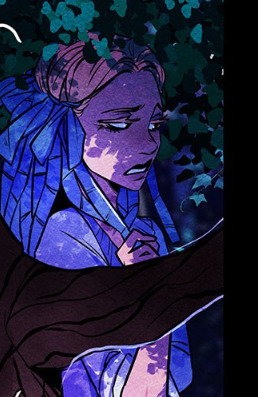
Doesn't.

Sit.
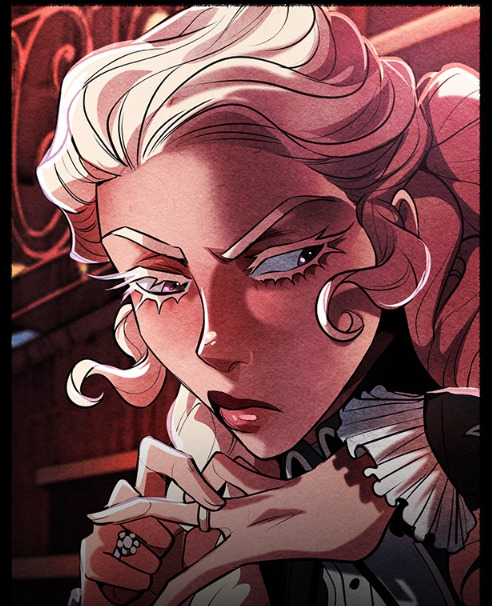
Still.
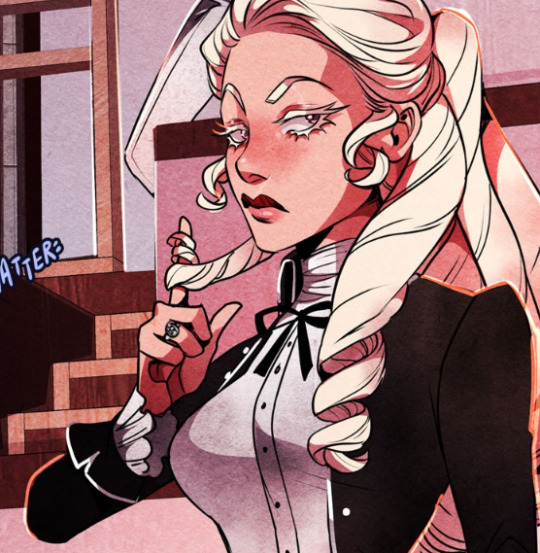
Never.
It is also clear that Annabel is always planning something. Always.
This can be read into the logic of mental hyperactivity: when you have it, your brain just doesn't stop. Ever. And that's something that resonates with this lady.
Emotional Dysregulation
The part of the brain that regulates our moods works…erratically. Not to say it doesn't work at all.
This leads to a painfully common problem in women with ADHD: lack of emotional regulation is seen as drama, and instead of being taught tools to deal with it, we are taught to repress and bottle up emotions.
Annabel has highly internalized this as a defense mechanism. But here's the thing: if repressing emotions instead of learning how to deal with them in a healthy way is harmful, being biologically unable to regulate them can be even worse.
It touches the right nerves, and if you catch us flying low, it can cause explosive outbursts.
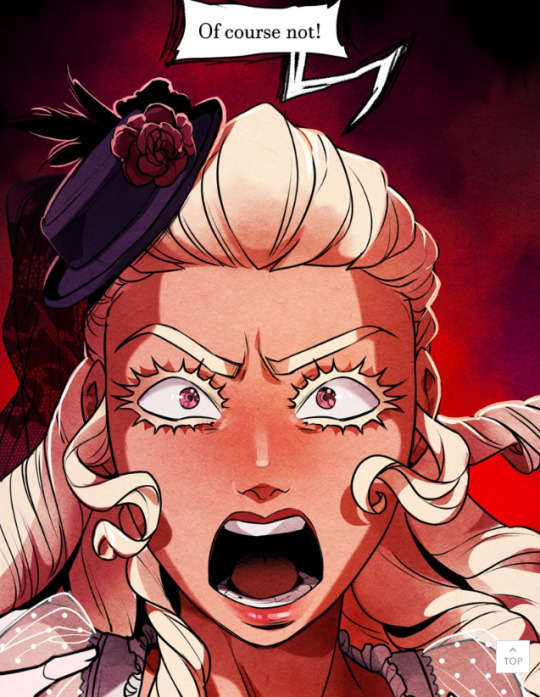
Possibly violent reactions to feeling offended or uncomfortable.
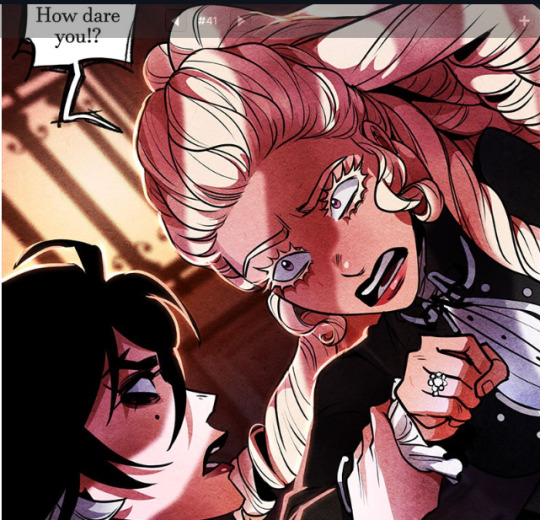
Or completely over-the-top reactions that we can't control.
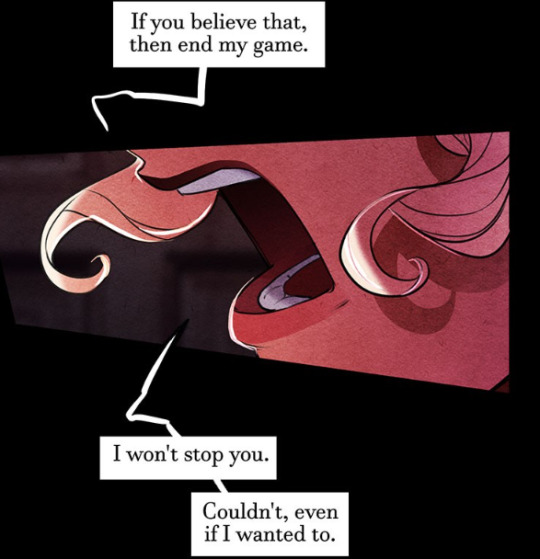
And it's not just anger that's affected, it's the whole emotional spectrum. Another emotion that is very noticeable is fear. If we don't develop tools to help us calm down, we don't get scared, we panic.
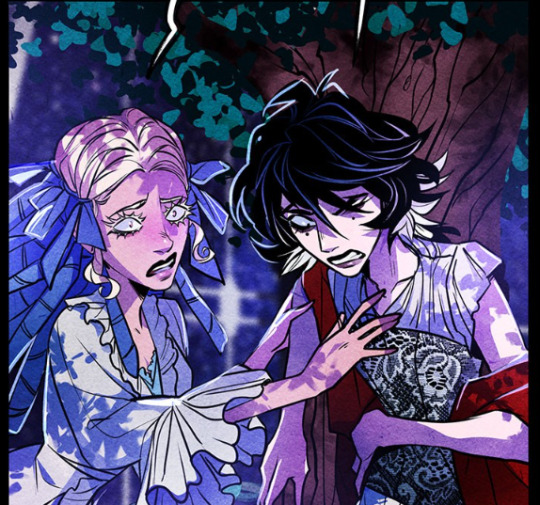
If this happens too often, we can become prone to developing severe anxiety or frequent attacks.

We may also have great difficulty dealing with frustration. Our brains love rewards, and feeling that we're not getting them because of our own inability to do something can be downright annoying. And if we don't have the tools to express our frustration appropriately, we can have quite childish reactions, ranging from temper tantrums to…pouting.
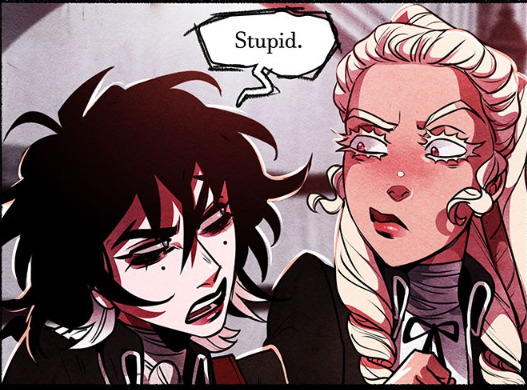
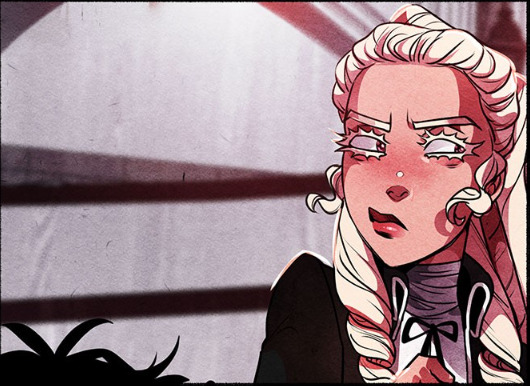
I find it funny how several of these pouts are caused by Lenore, a bit like "Oh, come on, honey, what are we talking about?"
Another important thing to note here is that one of the most fucked up and notorious symptoms of this lack of emotional regulation is RSD, short for Rejection Sensitive Dysphoria, defined as "a problem that interferes with your ability to regulate your emotional responses to feelings of failure and rejection. While rejection is almost always unpleasant, people with RSD experience overwhelming levels of emotional pain. This can lead to long-term mental health problems, fear of failure, and behavioral changes that negatively affect them throughout their lives."
Rejection and fear of failure are a problem for us. So much so that we may seek strategies to avoid it as much as possible, even when it causes us problems (such as not completing a task for fear of doing it wrong). This is an issue that can tear us apart emotionally.
Annabel is terrified of being rejected or despised. Her whole life has been built around appearances and getting the right people interested in her. If she can't do that, what good is she?
And that's something that comes up a lot in her relationship with Lenore. Repeatedly, in fact, but my favorite has to be this one:
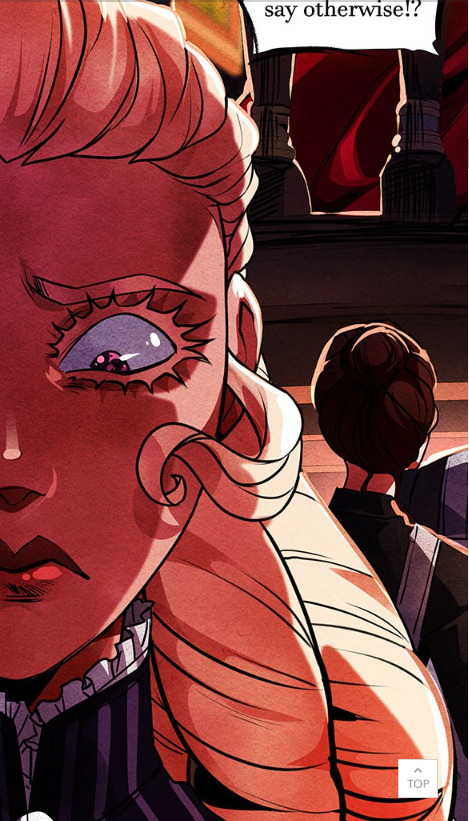
Annabel thought it would be the smart thing to do to break that bond because she knows they're never going to see each other again. But the look on her face when Lenore calls her a "damn liar" is just painful to watch. I think ripping her heart out with a rusty spoon would have hurt less.
Finally, on the subject of things that aren't so funny: that thing Annabel does about biting her fingers when she's in a critical situation is something I used to do, too (only I'd bite my knuckles or palms).

My psychologist explained to me that when you feel like you're losing control, you immediately look for something to ground you, and unfortunately, physical pain is often a quick (if damaging) way to do that.
Codependency
Okay, here's a thing: it's not that we have a tendency as such to codependency, but this is a situation that can occur due to bad practices within a relationship. Especially a couple one.
As it stands out, people with ADHD can have a lot of problems with micromanaging ourselves, remembering things, dealing with our emotions, etc, etc, etc. And it is natural for close friends, family or our partner to help in those processes.
The problem arises when that help starts to become a parentification process where the partner who is providing support starts to do this on behalf of the other person, infantilizing them in the process.
This is a cocktail for resentment on both sides: the party calling the shots can easily feel that the other is putting a huge burden on their shoulders and not trying hard enough, while, on the other side, no one likes to feel like they are being treated like a child. Let alone that the person doing it is your partner.
But at the other end of resentment, there's codependency.
The constant feeling that you are a burden, insufficient or even disposable.
And that means you have a lot to make up for. On a regular basis. So much that you put yourself in a situation where you have to make horrible decisions so that someone else doesn't have to because somehow you owe it to them, who hasn't had that happen?

What I mean is that yes, Annabel feels like she owes this to Lenore because she only remembers the part where Lenore came kicking in doors to save her from a marriage she didn't want. And if she can't do this for her, she doesn't deserve a relationship.
Feeling inadequate, that your partner is doing you some kind of favor by tolerating you and ending up idealizing their in the process is obviously not unique to the neurodivergent experience.
But we try, we try really hard and, like anyone else, we like to feel that the effort we put in is seen and valued.
If we are not careful about that, we do indeed fall into the risk of becoming codependent. The desire to feel loved or valued becomes a constant hunger for validation from which it is difficult to escape because we are aware that our brain will never function in a different way. And if that is mixed with RSD, it can become an even bigger problem.
Novelty, games, challenges, and rewards
Producing dopamine on a normal basis is one thing our brains aren't very good at (one of the reasons we can be prone to depression, for example), but you know what they love? Challenges and rewards.
New things feed our endless curiosity, but for some reason unknown to me, our brains really love challenges and dares. They give us dopamine like we're on a high.
So much so that some people use it as a tactic to perform tasks they don't like: "How many dishes can I wash before my dinner is ready?", "If I can finish this in less than 30 minutes, I can go get chocolate."

One medium we may like very much for this reason is games. Board games, card games, or virtual games. It doesn't matter. Games provide a very good balance of challenge and reward.
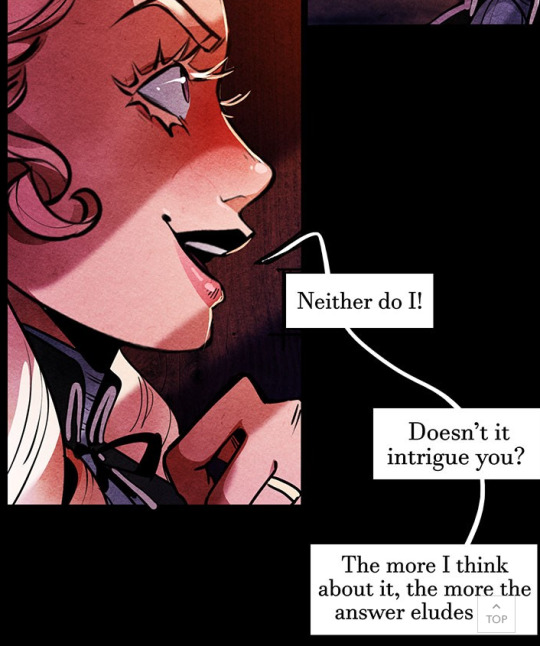
If you see that Annabel seems overly interested in how this works, it's because there may be a part of her that thinks "aside from the deadly situation we're in…this is like the most hardcore escape room ever" and inevitably there's something here that stirs her bug.
It may be something she loves about Lenore. As a good hypocrite, Annabel despises the rules she knows so well, so when Lenore comes along with this gimmick and completely changes the paradigm of what she knows, there is inevitably something that appeals to her. Others who are good at the game look down on Lenore's disdain for the rules, to Annabel it is fucking appealing because it offers a range of unexplored possibilities that she fucking loves.
Erratic Communication
When our brains are running at full speed, communication can become a challenge, and we tend to exhibit erratic patterns.
One of these is info-dumping. Touch a topic we know about or are interested in and it's like stepping on a landmine: we explode talking about it. Non-stop. You'll have to hit us to shut us up.

Another thing is that we can have a bad habit of interrupting. A lot. It's not malicious, it's just that we're really into the conversation and want to participate as much as possible.
That said, even if we're extroverts, it can be a nightmare to withhold information or participate in a conversation if it doesn't grab our attention. It's not that we want to be disrespectful or anything, it's just that, again, we have no control over our ability to pay attention and we're swimming against the tide to hold on to whatever it is you're telling us.
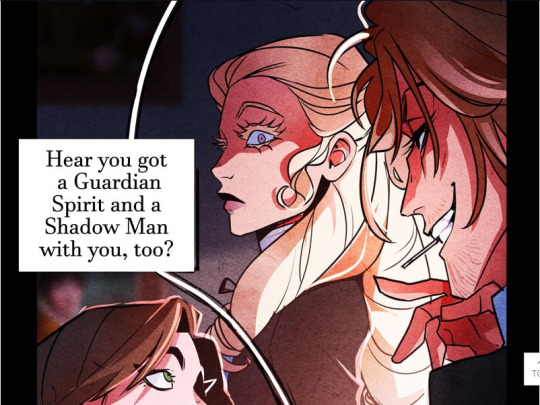
This scene is something I've seen in friends with ADHD and have been told I do: stare at people while doing your best to do the hamster run to remember what they're telling you because you know it's important, even though your brain is putting it together with junk information because it's not engaging your attention in the right way.
Ignore the murderous stare part, it's not that common - at least I hope not.
Drinks that are like a pill
Our brains are not designed to produce certain hormones naturally or, in some cases, they produce them under other circumstances. For things like that, we can take pills, develop strategies to help our brains produce hormones.
And drink coffee. Lots of coffee.
Caffeine can be extremely relaxing for us because it can actually help our brains keep functioning, you know that stereotype of the highly coded ADHD character who drinks coffee like it's his life? Well, that's because.

You know what other beverage has a similar effect? Tea. Theine is also a natural activator, perhaps less aggressive than coffee, but it can have a similar effect.
If you're interested in describing this topic in fanfic or touching on it in fanart, tea should have a relaxing effect on Annabel and even help her concentrate.
Boredom
We get bored. A lot. And we get painfully bored. Here's what happens: boredom is caused by a lack of stimulation, and our brains aren't stimulated just because we can't regulate our attention to seek out that stimulation.
Add to that the fact that when we are bored, without dopamine hitting our receptors, our executive functions diminish and we function like shit.

Boredom
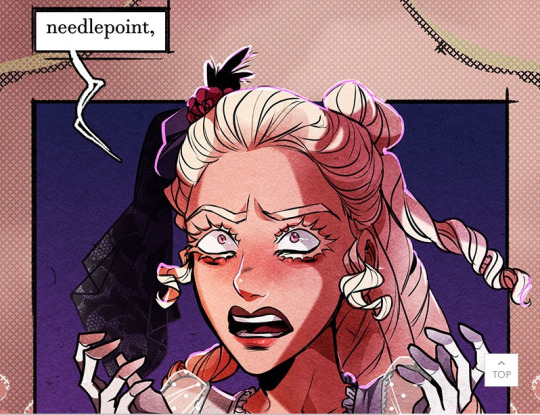
Is
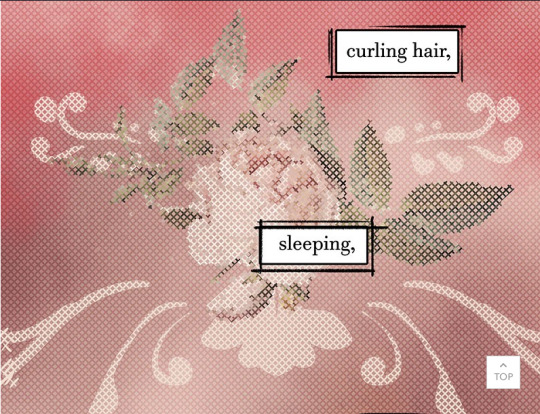
Fucking
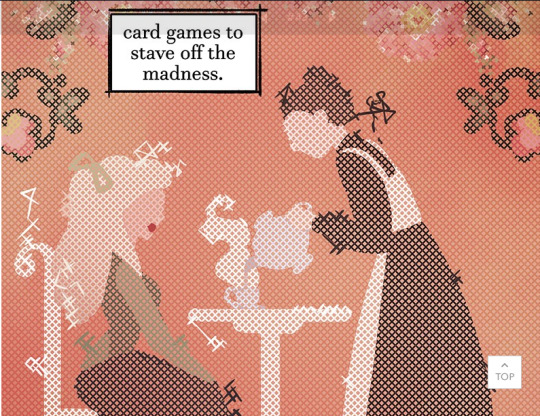
Murder
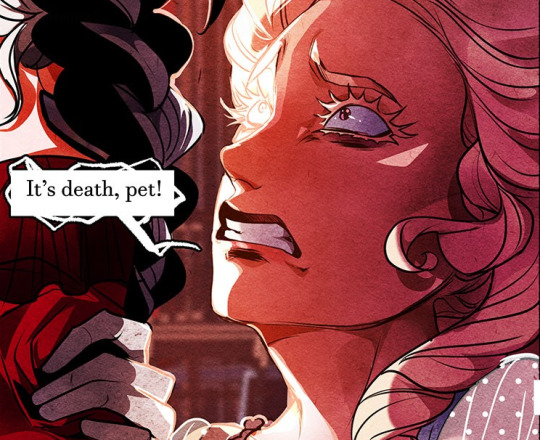
Because our brain starts desperately asking for dopamine and we can fall into really unhealthy behaviors like fighting, being chronically online, or eating because we can't find anything better to do. This also contributes -again- to our depression or anxiety.
Conclusions (and if I don't make the joke, I'll die)
In the book ADHD After Dark (a study of ADHD, relationships, and physical intimacy), Ari Tuckman draws some interesting conclusions, one of which is that on a statistical level, people with ADHD seem to be more likely to have what he calls "sexual eagerness": kinks, fetishes, a tendency to be adventurous in bed, and the like. Again, our brains love play, and both intimacy and flirtation can involve a lot of it.
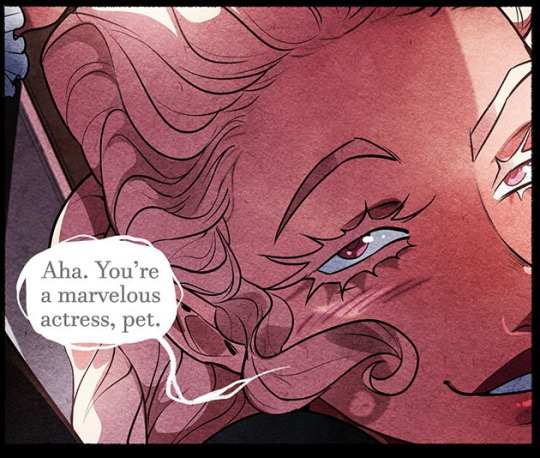
So…

Um…
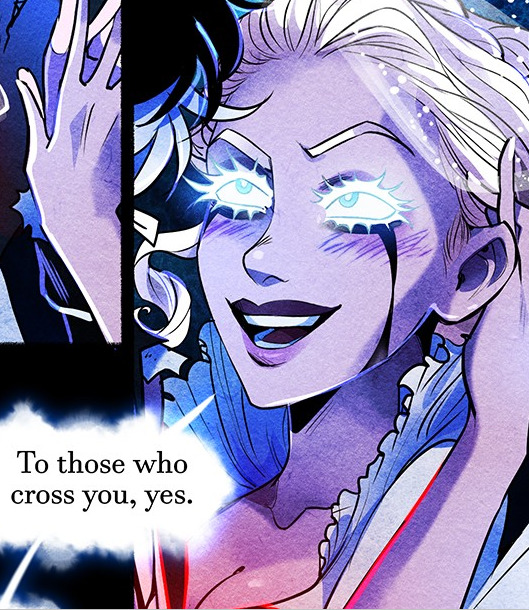
…well, I think Lenore will be happy. Good for her.
Anyway, this has been a seriously long explanation. Thanks for reading this far.
#nevermore webtoon#annabel lee nevermore#lenore nevermore#white raven#annabel lee whitlock#lenore vandernacht#annabel lee x lenore#lennabel#nevermore webcomic
221 notes
·
View notes
Text
Rationing of goods such as meat and fuel can both effectively and fairly reduce consumption with high climate impact. Almost 40% of the public say they could accept such measures. These are the findings of new research from the Climate Change Leadership Group at Uppsala University. "Rationing may seem dramatic, but so is climate change. This may explain why support is rather high. One advantage of rationing is that it can be perceived as fair, if made independent of income. "Policies perceived as fair often enjoy higher levels of acceptance," explains Oskar Lindgren, doctoral student in natural resources and sustainable development at the Department of Earth Sciences at Uppsala University, who led the study, now published in Humanities and Social Sciences Communications.
[...]
The new study involving nearly 9,000 people in Brazil, India, Germany, South Africa and the United States compares the acceptability of rationing fuel and so-called "emission-intensive" food, such as meat, with the acceptability of taxes on the same products. One conclusion is that the acceptability of rationing is on par with the acceptability of taxes. For example, 38% of the people surveyed were in favor or strongly in favor of fuel rationing. The corresponding figure for fuel tax was 39%.
30 September 2024
56 notes
·
View notes
Text
ARE YOU SURE?!
Episode 4 production Notes
Again, I genuinely didn't think I'd have anything to say at this point about this episode. I had such a good time the first time I watched it, just smiling the whole way through. There is one thing that did stick in my brain a little bit though so here I am again with another post.

Episode Break Points
We honestly can't be making any final conclusions at this point but there is starting to emerge a picture of how the production team approached the development of this show as an episodic release. The question that was rattling around my brain after watching episode 4 was how they are choosing their cut points between episodes. We really only have three data points right now which is not enough to definitively identify their intent but it does start to paint the picture a little bit. Sometimes, the break point is beyond obvious, like cutting ep.2 at the end of the USA trip. But when there's not a definitive line, a choice has to be made when to bring one episode to a close and start another.
Some shows use the changing of the day as a break point but that's not necessarily always the best choice to make for the narrative of the show. For example, the break between eps 1 and 2 is in the morning after JK has his coffee and makes the stone tower. This better served the momentum of the episode and wrapped up the story beat of JM's rough night. Ep 2 then starts on a high note with JK's motorbike ride. In my opinion, this was an excellent choice as we close ep.1 feeling all cozy and ep.2 begins with a little bit of excitement.
A Look Back

So why am I bringing this up now? It's because I was so confused as the choice of when to break these two episodes. I don't know if I've decided if it was good/bad/somewhere-in-between but I absolutely was not expecting Episode 4 to start the way it did. Ep 3 ends at the Go Karts and feels like a complete story beat. While ep 4 starts with the drive to the Omakase.
To me, it feels like we're picking up on the last remains of the previous episode and not starting a new section. Which is honestly, kind of counterintuitive. Why would it feel like that? They're literally on their way to the next activity. I suspect it has more to do with the tonal momentum. The guys are still coming down from all of the energy they expended from Rock Climbing and racing and are having a well-deserved relaxing drive. Even the brief moments we see of JK on the motorbike are quite chill. (mostly because there's not really a great way to get action footage on a bike in the dark lol).
So...to see if I could support my suspicion, or if I was just bringing something else into my viewing experience, I decided to rewatch the whole series so far and rank every story beat on a scale for how energetic/intense I felt the narrative was supporting.
A couple of notes before you judge my rankings:
This data is the very definition of subjective. if I redid this same exercise even the next day, I'm sure I would disagree with myself on certain rankings so you certainly don't have to agree with my rankings.
If a storybeat had a noticeable tonal shift, I entered it twice and included both rankings. If it just varied a bit, I entered a ranking more representative of the scene as a whole.
This won't be reflective of the time occupied by each story beat. Some sections are longer than others but with sustained energy so it doesn't translate in this visual representation how much of an impact on the overall tone of the episode any one of these are.
I also added a star at the end of each episode of my median scores. I feel that this was a better representation of the overall tone of each episode rather than an average but that's just my personal view on this teeny dataset. Please don't come for me analytics folks! This is just a post for funzies, not proper analysis!

So What?

The point was curious about is in the gap between eps 3 & 4. Everywhere else there's a pretty clear shift in the start and end of the energy but that gap looks like it was just a step that was missed in what could have been a continual episode.
Here are the runtimes of each episode so far:
USA: 56 min
USA: 72 Min
Jeju: 56 min
Jeju: 70 min
I don't have any conclusions about why it was done this way other than they felt the tonal break was the sacrifice for keeping the Omakase story line in tact. Which honestly, I agree. There would have been time to include the drive in the previous episode but it would have left us on an unfinished storybeat. This is one of the reasons that we never get footage of the members return trip from their travel shows. Bon Voyage ends every episode with the members remarking on the trip overall. Even though we know they have to return home, we don't see it because that would start to build energy for whatever they're doing next and not the story of their trip.
Even in ITS1 when the members do return home in the middle, we see them packing up and getting in the cars but the episode ends before they really start traveling. (Actually it ends before they even let Jin in the car so they're definitely not on their way yet!)
Commercials?

I have a question for anyone that's watching this with ads. I don't really watch streaming content so I'm curious, do the ad breaks just randomly occur? Or does it seem like they're intentionally scheduled? Building story breaks for commercials was a huge focus of legacy tv and I'd be interested to learn more about how streaming services are incorporating it (not enough to not have commercials though, I get insta-rage when the content I'm consuming is interrupted lol). I vaguely remember getting frustrated when I was attempting to watch something at my parent's over the holidays but I don't recall if it seemed structured or not.

That's it. That's all I've got to say right now. We're definitely getting a lot more to the story of this show and I'm absolutely loving it. I'm going to be away for a bit next week and I honestly don't know when I'll fit in watching episode 5 but I'm very much looking forward to it!
If you've seen this post and are interested in some more of my thoughts on Are You Sure, here's a link to my AYS MasterList. Still can't believe I've rambled so much about this show but it's been fun! Thanks to everyone that's been rambling with me!
55 notes
·
View notes
Text
Sustainable Development
Outline Headings Sub-Headings Introduction Definition of Sustainable Development Importance of Sustainable Development Global Impact Sustainable Development Goals (SDGs) Overview of SDGs Importance of SDGs Economic Aspect of Sustainable Development Economic Growth and Sustainability Green Economy Environmental Aspect of Sustainable Development Conservation of Natural Resources Climate…
#sustainable development#sustainable development 17 goals#sustainable development 3 pillars#sustainable development advantages#sustainable development article#sustainable development assignment#sustainable development assignment pdf#sustainable development benefits#sustainable development books#sustainable development case study#sustainable development challenges#sustainable development chart#sustainable development class 10#sustainable development class 10 project#sustainable development class 12#sustainable development class 8#sustainable development conclusion#sustainable development cover page#sustainable development definition#sustainable development definition class 10#sustainable development diagram#sustainable development disadvantages#sustainable development drawing#sustainable development drawing for project#sustainable development economics#sustainable development environmental law#sustainable development essay#sustainable development examples#sustainable development explain#sustainable development features
0 notes
Text
The Incompetence of the FIA
FIA's Safety Shortcomings: A Critical Overview of Formula 1
In the high-stakes world of Formula 1, the recent history of crashes and fatalities has brought the FIA's (Fédération Internationale de l'Automobile) commitment to driver safety into serious question. Below, I present a concise analysis of notable incidents and the inadequacies in FIA's responses.
Historical Context of Safety Incidents in F1
Tragic statistics: Since its inception in 1950, Formula 1 has witnessed 52 drivers tragically lose their lives in various incidents throughout races, practice sessions, and even non-championship events.
This grim tally reflects an ongoing concern over driver safety.Some key incidents include:-
Ayrton Senna (1994): The loss of this racing icon at the San Marino Grand Prix due to a steering failure prompted a critical reevaluation of safety protocols.-
Jules Bianchi (2015): Following severe injuries sustained in a crash during the 2014 Japanese Grand Prix, pivotal safety innovations such as the Virtual Safety Car and the Halo device were introduced.
A Decade Without Losses:
The 2000s marked a notable achievement: a decade without driver fatalities. This was not mere luck but rather a direct result of the FIA's implementation of rigorous safety measures.
Evaluating FIA's Safety Efforts:
Inadequate Response to Concerns:
The FIA has consistently lagged behind in addressing safety issues raised by drivers and teams. A case in point is the 2021 Miami Grand Prix, where drivers voiced concerns over unsafe barriers following several accidents. The FIA's response? A lack of action that left many frustrated.
Preparedness Lapses:
The tragic incident at the 1973 Dutch Grand Prix, which resulted in Roger Williamson's death due to inadequate safety protocols and missing equipment, exemplifies the FIA’s failure to maintain a proactive safety strategy. It raises the question: Why are fundamental safety measures not being prioritized?
Recent Developments and Safety Challenges
Alonso's Candid Critique:
Fernando Alonso has openly criticized the FIA stewards, emphasizing their perceived lack of professionalism and failure to address critical safety concerns. His comments highlight how driver safetyissues often go unheard, particularly regarding the absence of protective barriers at key corners—an unacceptable oversight.
Drivers Unite for Enhanced Safety:
The Grand Prix Drivers' Association (GPDA) is now advocating for heightened safety standards and better communication with the FIA. They demand acknowledgment and respect for their concerns regarding their safety on the track.In conclusion, the FIA's track record on safety is becoming increasingly untenable.
It's time for significant improvements in their approach to ensure the well-being of drivers.
#formula none#f1#formula 1#max verstappen#daniel ricciardo#charles leclerc#george russell#lewis hamilton#zhou guanyu#valtteri bottas#fuck the fia#anti fia#oscar piastri#alex albon#logan sargeant#lando norris#nico hulkenberg#nico rosberg#fia is a joke
31 notes
·
View notes
Text
Expert policy-makers in Western capitals feel that they have to make a response to major historic challenges like climate or the rise of China, or South Africa’s energy crisis. It is their job to look to the future and to devise at least purportedly rational strategies of power. But those who make policy on such matters as sustainable development do not hold the purse-strings and have limited capacity to shift budget-constraints. Those that do set budgets, either do not care about broader global issues, prefer other tools for affecting those goals - such as military power - or are revenue constrained and unwilling to levy more revenue from their constituents for the far-flung goals favored by the policy-making elite.
There is thus never “enough money” for the softer and more complex dimensions of development and global policy. But, despite these all too obvious limitations, the policy-machine grinds on. Faut de mieux those tasked with geoeconomic policy and sustainable development cooperate to come up with programs like JET-P. The policies tick all the boxes as far as sophistication of design and conception. Powerful interests - notably high-finance - ensure that they are arranged, at least notionally, so as to offer derisking and to promote the vision of public-private partnership. The promise of “mobilizing” private money helps to paper over the lack of solid public funding.
But despite all the self-interested engagement by private finance, the fiscal constraint remains paramount. The forces interested in global development are not as powerfully engaged as they are around the military-industrial complex, oil and gas or the Wall Street nexus. The result are ambitious and professionally designed policies that whip up waves of enthusiasm in the ranks of analysts, think tanks, NGOs, pundits, but which have no prospect of materially affecting reality either with regard to the announced policy objective or the profit opportunities of Western capital.
From experience since 2021 the conclusion we must surely draw is that the one interest that such policies undeniably serve is the perpetuation of the policy circuit. Practical effectiveness is not necessarily the main driver of policy-generation. Indeed, failure may be productive in generating new policy. This not only perpetuates the machinery of policy-making. More importantly it contributes to the generation of a “state effect” - the US has a policy for x,y,z. It sustains the common sense that the world is governed and that “governance” is in some sense a coherent process.
brutal
76 notes
·
View notes
Text
We should also consider if the inhabitants of the mega-sites consciously managed their ecosystem to avoid large-scale deforestation... Archaeological studies of their economy suggest a pattern of small-scale gardening, often taking place within the bounds of the settlement, combined with the keeping of livestock, cultivation of orchards, and a wide spectrum of hunting and foraging activities. The diversity is actually remarkable, as is its sustainability. As well as wheat, barley, and pulses, the citizens' plant diet included apples, pears, cherries, sloes, acorns, hazelnuts and apricots. Mega-site dwellers were hunters of red deer, roe deer, and wild boar as well as farmers and foresters. It was 'play farming' on a grand scale: an urban populous supporting itself through small-scale cultivation and herding, combined with an extraordinary array of wild foods. This way of life was by no means 'simple'. As well as managing orchards, gardens, livestock and woodlands, the inhabitants of these cities imported salt in bulk from springs in the eastern Carpathians and the Black Sea littoral. Flint extraction by the ton took place in the Dniestr valley, furnishing material for tools. A household potting industry flourished, its products considered among the finest ceramics of the prehistoric world; and regular supplies of copper flowed in from the Balkans. There is no firm consensus from archaeologists about what sort of social arrangements all this required, but most would agree the logistical challenges were daunting. A surplus was definitely produced, and with it ample potential for some to seize control of the stocks and supplies, to lord it over others or battle for the spoils; but over the eight centuries we find little evidence for warfare or the rise of social elites.
a description of talianki (located in modern day ukraine), a neolithic site from 5,700 years ago (inhabited from roughly 4100 to 3300 bc) from the dawn of everything by davids: graeber and wengrow
once again this book is fantastic - and one of its main theses is that "the agricultural revolution" and some of the conclusions we draw from it are, largely, not true.
the development of farming in human societies is a much much longer and more "playful" process than popular narratives would have us believe. 'agricultural revolution' suggests an on/off switch almost. and the way it's usually taught sees agriculture being "invented" and then spreading like wildfire to take over the globe - only then allowing for true cities and the "necessary evils" they entail. this simply isn't true. an urban, farming society is not automatically doomed to bureaucracy, inequality, and exploitation.
all across the world the archaeological evidence points to the domestication of plants taking literal thousands of years longer than it "ought to." and then, even when the domestication of a wild plant was complete there isn't an immediate rise of huge fields and class stratification (as the popular narrative goes). again - in the magnitude of multiple thousands of years. we have generations upon generations of humans with farming know-how who don't immediately begin a march of politics and inequality precipitated by farming.
agriculture isn't humanity's curse no matter what the memes and capitalists say. we are not doomed to our current ways - we can imagine, we can build, we can create new ways of being. the past is the present is the past. and fuck you capitalism and doomed "human nature" debates. and read the dawn of everything <3
#eezordalf's wisdom#anthropology#david graeber#david wengrow#books#history#wizardblr#wizardposting#the dawn of everything#talianki#ukraine#archaeology#neolithic#prehistory#studying my tomes#humanity i love you#the human condition#human experience
216 notes
·
View notes
Note
I don't think opposing US entry into WWII was the incorrect view? The US had strong ties to Nazi Germany, the US Nazi party was strong, and Franklin Roosevelt agreed with Nazi antisemitism. There was no reason to think the US would do anything other than what they did - rehabilitate and coop fascists into their own empire. The USSR would have won with or without the US joining and, frankly, would have been much better without them. The CPUSA absolutely is revisionist and useless, but that was one area they were right about.
I cannot help but disagree for exactly the reasons you laid out. The US were nazi allies, they just decided, as fascists do, to take over the competing enterprise when they had an opportunity. US-governed Germany or Japan was just as fascist as before, but now was integrated into a much larger project of extermination with a more sustainable methodology - the holocaust by bullet that was visited upon most of eastern europe was replaced with a holocaust by stratofortress and napalm. When the US appropriated half of the Korean peninsula from the Japanese empire it did not do all that much to improve the lot of the Korean people, it just widened the scale of collaboration and allowed the Korean armed forces and KCIA to take part in the massacre of Vietnamese.
For exactly these reasons the US victory in the US-German war (and US-Japanese war) was not a victory for the proletariat, it was a battle between empires where the proletariat were both the prized resource to be won, as well as the blood that fueled the contest of industrial production capability. The CPUSA's decision to cease and condemn anti-government actives and sabotage, in support of the US state's war effort, was a clear and evident failure of policy that had an entire party suddenly stop listening to genuine complaints from striking workers and start jingoistically parroting government slogans about supporting the nation. Germany and the US were and are functionally identical in their nature as bourgeois states, Germany was simply, due to its more developed class relations and contradictions, as well as economic pressure following military defeat, put in a position where it came into conflict with its hostile brother. A manufacturing empire and a merchant empire went to war at sea, and at home their communists sat mutely.
'Conversion of the imperialist war into revolutionary war' is not merely a slogan, it is an inevitable conclusion.
42 notes
·
View notes
Text

AFRICA, a continent rich in history and culture, was a diverse and vibrant place 100 years before the colonial era began. The period prior to European colonization of Africa was characterized by the existence of powerful and sophisticated civilizations, trade networks, and diverse societies. During this time, Africa was home to thriving kingdoms and empires, such as the Kingdom of Ghana, the Mali Empire, the Benin Empire,and the Great Zimbabwe Empire.
One of the remarkable aspects of Africa before colonialism was the economic prosperity and trade networks that existed across the continent. The Trans-Saharan trade routes connected the North African coast with the interior of the continent, facilitating the exchange of goods, ideas, and cultures. The trade in gold, salt, ivory, and other resources contributed to the wealth of African societies and enabled the development of urban centers and marketplaces.
In addition to trade, agriculture played a significant role in the pre-colonial African societies. Many regions practiced advanced farming techniques, growing crops such as grains, yams, and millet. Livestock farming was also a common practice, with cattle, sheep, and goats being raised for food, milk, and trade. The agricultural surplus generated by these practices supported the growth of populations and the development of complex societies.
Socially and culturally, pre-colonial Africa was characterized by a rich tapestry of traditions, languages, and belief systems. The continent was home to a diverse array of ethnic groups, each with its own customs, art forms, and social structures. Oral traditions, storytelling, and music played a vital role in communicating histories and values within African societies. Religious practices were also diverse, ranging from indigenous animist beliefs to Islam and Christianity, which were introduced through trade and migration.
The political landscape of Africa before colonialism was marked by the presence of powerful kingdoms and empires that governed vast territories. These political entities were often organized hierarchically, with rulers holding significant authority over their subjects. The Kingdom of Ghana, for example, controlled trade routes and amassed wealth through taxation and tribute. The Mali Empire under Mansa Musa was renowned for its wealth, power, and intellectual pursuits.
In conclusion, Africa 100 years before colonialism was a continent teeming with cultural diversity, economic prosperity, and political sophistication. The continent's vibrant civilizations and societies thrived through trade, agriculture, and social structures that sustained their way of life. The legacy of pre-colonial Africa continues to influence the continent's present-day cultures, identities, and aspirations, reminding us of the resilience and vitality of Africa's past.
📸 A lady from today Ghana 🇬🇭 adorned in gold jewelry #africa
47 notes
·
View notes
Text
The Evolution of Conscript Protection: Mandatory Introduction of Armour Suits
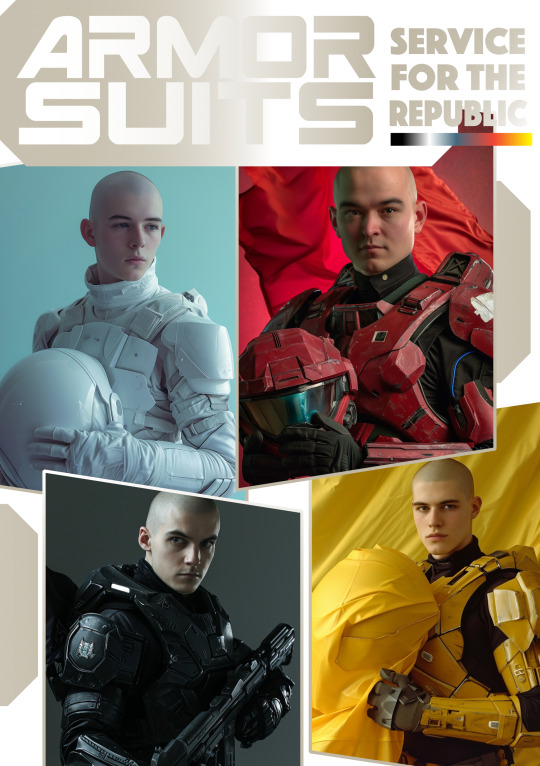
Abstract:
In this paper, we examine the historical trajectory leading to the mandatory introduction of armour suits for conscripts serving in the Security Forces, Life Guards, and Paramedic Corps. The Conscripts Rights Organization (CRO) played a pivotal role in advocating for this measure, primarily to ensure the physical safety and well-being of conscripts during their service. While the introduction of armour suits offered enhanced protection, it also came with certain drawbacks, including increased training complexity, conditioning requirements, and the imposition of technological interfaces such as Heads-Up Displays (HUDs) and mandatory helmet usage. Furthermore, the influence of defense contractors in driving this development is explored, shedding light on the economic interests at play.

Introduction:
Conscript service has long been a hallmark of societal obligation in our dystopian reality, with individuals mandated to serve in various capacities for the betterment of the state. However, concerns regarding the safety and welfare of conscripts during their service have persisted, prompting calls for enhanced protective measures. The Conscripts Rights Organization emerged as a prominent advocate for conscript rights, pushing for reforms aimed at ensuring the physical integrity of those serving their mandatory terms. One significant outcome of their advocacy efforts was the mandatory introduction of armour suits for conscripts in key service branches.

Historical Context:
The roots of the mandatory introduction of armour suits can be traced back to a series of incidents highlighting the vulnerability of conscripts to physical harm during their service. Reports of conscripts sustaining injuries or even fatalities in the line of duty sparked public outrage and prompted demands for better protective measures. The Conscripts Rights Organization, galvanized by these events, began lobbying for comprehensive reforms to safeguard the well-being of conscripts.
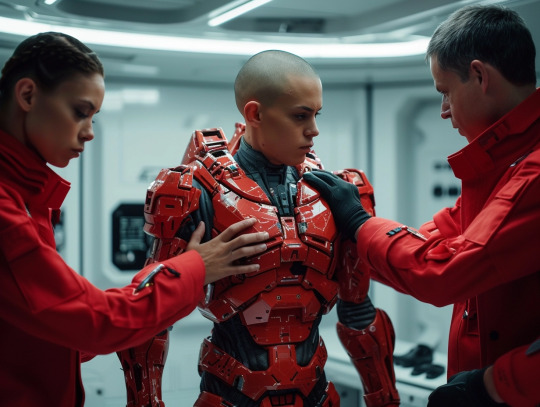
Key Drivers:
The Conscripts Rights Organization identified several key drivers behind the push for mandatory armour suits. Foremost among these was the imperative to minimize physical harm and casualties among conscripts. Armour suits offered a tangible solution to this pressing concern, providing enhanced protection against various threats encountered during service, including ballistic, chemical, and biological hazards. Additionally, the CRO emphasized the principle of conscript rights, arguing that individuals compelled to serve should be afforded adequate protection as a basic entitlement.
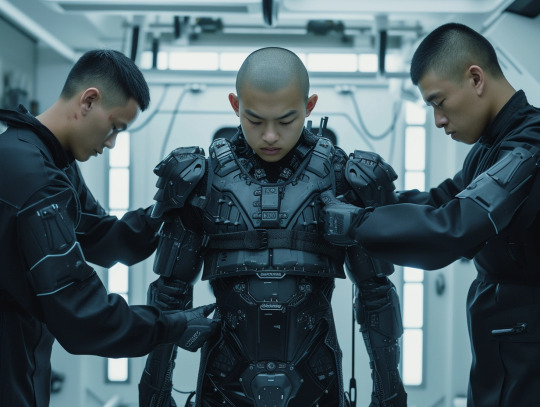
Challenges and Drawbacks:
While the introduction of armour suits represented a significant step forward in conscript protection, it was not without its challenges and drawbacks. Training conscripts to effectively utilize and maintain armour suits posed logistical and resource challenges, requiring additional investment in training infrastructure and personnel. Moreover, the conditioning required to acclimate conscripts to the use of technology interfaces such as HUDs and helmet-mounted communication systems presented psychological and behavioral hurdles. The imposition of strict protocols regarding helmet usage, particularly during public interactions, also raised concerns about the erosion of individual autonomy and privacy.

Influence of Defense Contractors:
An often-overlooked aspect of the mandatory introduction of armour suits is the influence of defense contractors in shaping this development. As providers of advanced protective technologies and equipment, defense contractors stood to benefit economically from the widespread adoption of armour suits among conscripts. Their lobbying efforts and collaboration with governmental agencies played a significant role in driving the policy agenda towards mandatory implementation.
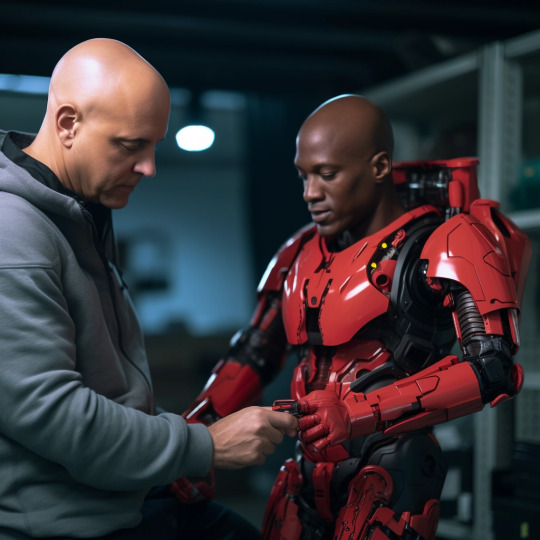
Conclusion:
The mandatory introduction of armour suits for conscripts represents a pivotal moment in the evolution of conscript protection and welfare. While aimed at enhancing the safety and security of individuals serving their mandatory terms, this development also underscores the complex interplay between societal obligations, technological advancements, and economic interests. Moving forward, it is imperative to strike a balance between ensuring conscript safety and preserving individual freedoms and rights in the context of mandatory service.

60 notes
·
View notes
Text
On May 16, the gaming and entertainment news site Dexerto tweeted an image from the forthcoming game Assassin’s Creed Shadows featuring one of its protagonists, the Black samurai Yasuke, in a fighting pose. Across scores of replies, some voiced optimism, others fatigue with Assassin’s Creed’s now 14-game-long run, and a very vocal few expressed frustration and anger that a Black person was at the center of the narrative.
“Gonna pass on the DEI games,” wrote one blue-check X user, referencing the acronym for diversity, equity, and inclusion. “Why Wokeism?” asked another. Comments full of racist and sexist language filled the thread.
A more articulate undercurrent of these reactionaries, across many online forums, had a more specific set of complaints. Some alleged the race of the real Yasuke was never known, others that he wasn’t a samurai but a retainer, and another claimed he was never in combat.
These were all fairly elaborate conclusions to draw about a guy from 1581 who’s been depicted as a samurai in Japanese media many times, including in the 2017 video game Nioh and Samurai Warriors 5 in 2021, as well as his own animated series on Netflix.
They also may have been the last bit of armchair history we got on Yasuke if the conversation hadn’t been sustained by a set of accounts looking to build yet another front in the online culture war, fueling what some have been calling Gamergate 2.0. Whereas the Gamergate of 2014 focused on trying to drown out feminist voices, and the voices of women of color, in gaming culture, this second incarnation seems focused on pushing back against diversity in games of all kinds. Yasuke just stepped in their path.
The resurgence of the Gamergate moniker came earlier this year in reaction to the work of Sweet Baby. Staff at the small consultancy received a wave of harassment this spring stemming from misinformation and conspiracy theories claiming the company was a BlackRock-backed outfit trying to force diversity into games. (It’s not affiliated with BlackRock and merely advises on characters and storylines.) As the controversy around Assassin’s Creed Shadows intensified, several posts mentioned Sweet Baby, even though company CEO Kim Belair says the firm didn’t work on the game.
“I think it just comes with the post-Gamergate (late-Gamergate?) territory,” Belair wrote in an email to WIRED. “To a certain kind of person, largely trolls, we're synonymous with their idea of ‘wokeness in games’ or a vague idea of ‘DEI,’ but it's ultimately reflective of the overall misinformation that fuels this campaign.”
Gamergate was not the first harassment campaign conceived in the bowels of 4chan and its affiliate websites, but it was perhaps their crowning achievement. The attacks against developers Zoë Quinn and Brianna Wu and media critic Anita Sarkeesian, among others, ranged from doxing to rape and death threats. Its tenets and tactics eventually proved valuable in bringing people into the burgeoning alt-right movement. Even Pizzagate and QAnon can, in some ways, be traced back to what was happening with gamers online in 2014.
“Gamergate was a recruiting ground, a pipeline to leverage the loneliness, discontentment, and alienation of young men—often white young men—into alt-right politics, extremist misogyny, and outright white supremacy and Nazism,” Thirsty Suitors narrative lead Meghna Jayanth told WIRED.
If the early days of social media incubated a cultural cold war, Gamergate turned it hot. Frustrated that they were no longer the sole demographic being catered to, Gamergaters saw “the growing visibility of women, not to mention their incomprehensible insistence that games cater to their perspectives as well, as an unwelcome intrusion in a space that does not belong to them,” Laura Hudson wrote in WIRED at the time. As a result, they wanted more than debate, they wanted blood—and nothing really stopped them from going after it.
Ten years later, aggrieved gamers are focusing on other forms of diversity and inclusion, which is how Assassin’s Creed Shadows’ Yasuke has become the latest point of contention.
While only so much can be truly known when it comes to history, accounts suggest Yasuke (the real one, not the video game character) was a man presumed to be from west Africa who served the Italian missionary Alessandro Valignano. He accompanied Valignano to Japan where he served Oda Nobunaga at the daimyo’s demand. Yasuke was presented with the trappings of a samurai: a house, servants, a sword. He would go on to be with Nobunaga, or near him, at the time of his death, before seeking his heir Nobutada and joining him in battling those responsible for Nobunga’s death, though unsuccessfully.
While Yasuke’s history is fascinating and mysterious, much of the fuss over him has concerned whether he was officially a samurai, a depiction that has shown up in media several times in and outside of Japan. Some insist that he may have instead been a retainer, page, squire, or sword-bearer. Others decrying his inclusion in Shadows said he looked gay.
“There is no easy way to separate the many threads of what we are seeing within the Yasuke backlash,” says Paula Curtis, a postdoctoral fellow at UCLA’s Terasaki Center for Japanese Studies. “There are legitimate complaints about the developers’ decisions regarding representation and historical engagement … There are also many discriminatory responses to the game that have been anti-Black, misogynistic, and politically motivated.” It’s important to note, Curtis adds, that Shadows’ fans and commentators, and the issues they’re raising, aren’t uniform.
When Japanese historian Yu Hirayama tweeted there was “no doubt” as to Yasuke’s samurai status, he was treated to a tirade of abusive replies in English, including one claiming he brought “dishonor to [his] family and Japanese history.”
Amid the backlash to Yasuke’s inclusion in the game—and specifically to his role as a samurai—Ubisoft, the game’s developer, issued a statement saying that while the company “extensively collaborated with external consultants, historians, researchers, and internal teams at Ubisoft Japan” on the game, “some elements in our promotional materials have caused concern within the Japanese community.”
Without saying specifically which aspects caused concern, the company added that it was taking this “constructive criticism” into account as it prepared for the game’s November launch, and apologized. (Ubisoft did not respond to a request for comment on this story.)
Jayanth believes the apology was a case of misplaced appeasement.
“The alt-right's fundamental drive is hatred of the ‘other,’” she says. “Even if we cleansed our games of women, non-white people, queer people—which is their ask, and one we absolutely should not give in to—they would turn to insufficiently ‘masculine’ depictions of white men. This movement exists only in opposition to some polluting ‘other,’ an enemy that must be manufactured if a real enemy cannot be found.”
Revisionist approaches to history have seen a rise in recent years, especially in the interest of enshrining an idealist sense of a traditionalist past as an ahistorically conservative utopia.
“You see this in the false assertion of a purely white Middle Ages or the denial of war atrocities in World War II,” Curtis says. “Bad-faith actors may cherry-pick historical sources in order to craft specific narratives, completely ignore sources that do not support their views, or appropriate historical symbols as rallying cries to their causes.”
The proponents of Gamergate 2.0 have veiled their scorn for Assassin’s Creed Shadows’ inclusion of Yasuke within concerns for historical accuracy. Much Like the Gamergaters of old, who insisted they were defending ethics in gaming journalism and not harassing women they felt needed to be put in their place.
Gamergate then, and Gamergate now, are both ultimately about the sensitivities around who saw representation and how, made disproportionately important by how disempowered and alienated modern people feel. As games have made room for a wider array of characters, the gamers at the center of the backlash have seen this progress as a form of persecution. Games are changing, and as much as those upset over Yasuke’s inclusion in Shadows want to push back, they may not be able to stop that.
“It's certainly been strange to see us tied to a ton of games we've never worked on simply because people perceive ‘wokeness’ or progressive ideas in them,” Sweet Baby’s Belair says, “but maybe it's indicative of a greater truth that Gamergaters miss: No external consultancy is forcing studios to make their products more diverse or more progressive. The change, whatever you think of it, is coming from inside the house.”
28 notes
·
View notes
Text
Happy Mother's Day!
(for those who celebrate and for the countries it's celebrated in. I know that not everybody does).
The mothers of Magi are great. I don't necessarily mean all good. The quality (how good they are as mothers) ranges largely from amazing to Gyokuen. That, in itself, is amazing. I like to see parents that aren't the same note, whether good or bad. It's also nice with the variety of mothers especially.
I want to take the time on focusing on one of them, and my conclusion that the most interesting character study in this regard is Scheherazade.
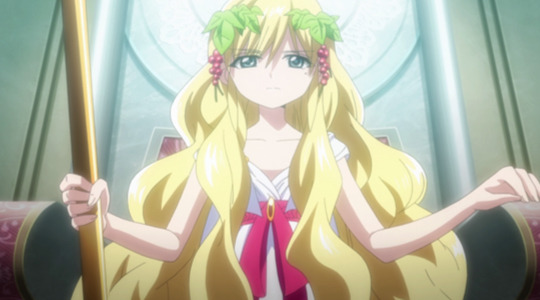
She is a deeply flawed person in this regard. She's a shit mother for the majority of the time with Titus. However, I do not believe it is intentional on her part, or something that she even recognizes right away.
I want to make clear before I get too deep into this that I still love Scheherazade as a character, and this isn't an attack against her but more so an examination of how her motherhood compares to being decent and how it doesn't.
The root of the problem is Scheherazade is the parent who just expects her children to be like her. So much so that she ignores all the agency that they have to be their own person, which will determine that they have different things to give a shit about, ones that do not align with hers.
This makes sense as she makes them as clones, to do something she cannot or else the main one to keep her youth. They are her in the most literal sense. Titus has had self-awareness sustained to where he develops his own thoughts and perspectives. Then Scheherazade doesn't recognize it right away. Eventually, but not right away.
The second flaw for Scheherazade being a good mother is that she loves Reim and the nation she fostered to a fault.
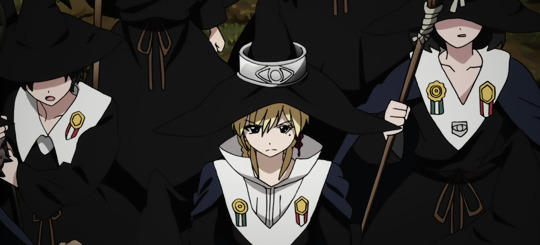
Again, this is something that she recognizes and relents to after being confronted with it. That the love of the country she helped foster and built is actually fucked in some ways. That maybe, quite possibly, being an imperialist slave-trading/owning state is fucked. No shit. How does this impact on how she's a mother to Titus? She uses him as a rally to her troops when invading Magnoshutatt. Scheherazade acts as if he was kidnapped, and that a goal of taking Magnoshutatt is to take him back and bring him to safety. Since it is a message given to the whole battlefield, Titus does hear it and recognizes the bullshit, not that any of the Reim soldiers can see him.
That is messed up to use your authority over a child (or anyone dependent on you) as a reason to harm anyone else and acting like the child endorses the behavior. If someone is fighting for someone else, with the knowledge and consent of that person, yeah, that's cool. If it's defending someone else, like someone standing in between one party and danger, yup, checks out. Using someone else and their perceived safety to actively attack someone, when you know explicitly that goes against their wishes. Nope, not cool.
Some precise examples outside the broad strokes:
When Titus is reporting to Scheherazade, He goes off topic since he is a child who is finally able to be out and about in the vibrancy of the world. That is what he focuses on. She dismisses him and tell Titus to get to the point. It is understandable from her position, but it is unnecessarily harsh. For Titus, he is talking to his mother and hoping to get positive affirmation with sharing his experience. The best case I can describe Scheherazade is she treats him more like an employee. Not an inaccurate descriptor, but Titus is clearly distraught and thrown off guard from the dismissal and Scheherazade shows nothing in addressing it.
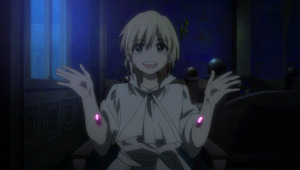
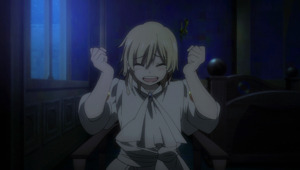
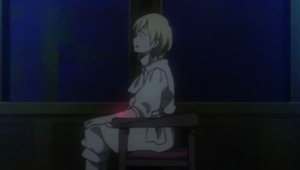
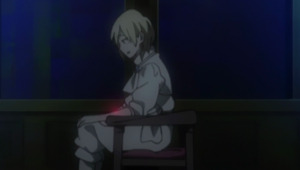
That's an awful look for her. However, when meeting up again she tells Titus he should go back to Marga after telling him their lifespan is almost out. He seems taken aback that Scheherazade remembered her. She paid attention to some degree and could guess what he would want to do at the end of his life.
The second is when she overrides her rukh with his to stop Titus from Falling. It is an emergency situation, and her safety is as at risk as much as his. That said completely ignoring his bodily autonomy is uncalled for. Scheherazade does not leave it at that. She takes the opportunity to threaten Mogamett and his country while possessing a child's body. Same as above when I mentioned her using Titus as a reason to be an imperial bitch, this time manipulating Titus quite literally.
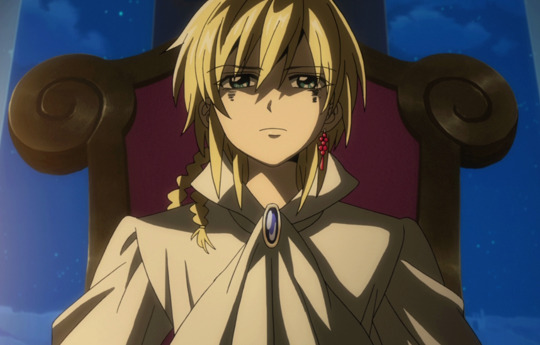
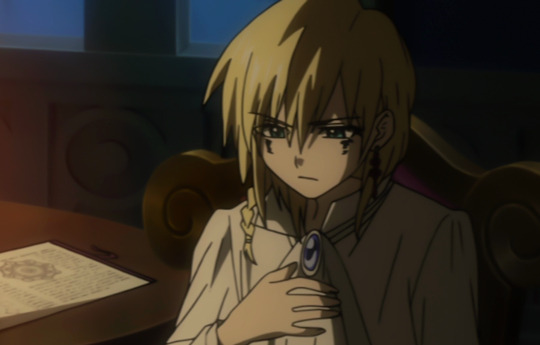
All that said, I do see Scheherazade as a decent mother. Why? I think what separates her from say Gyokuen, or Aum Madura, is that she is ignorant on Titus being his own person. She's not used to her clones to have the degree of autonomy that Titus has. She treats him as an employee and extension of herself but despite it all I have never felt malicious intent. It doesn't excuse her, but it is understandable. Unlike the latter two, who fully know they are destroying children's lives for their benefit and have no compassion for them.
Scheherazade lets him go. She apologies to Titus, and he does not have to forgive her. He does because he's precious, and he sees her as someone who was his anchor and who told him about how wonderful the world was before he could see it. Titus was so hurt by her coldness because he believed she cared. She shows she does. Scheherazade is heartbroken and furious when she realizes that Titus died and used the last of his energy to try to save Mogamett.

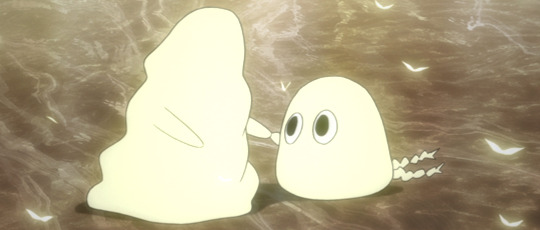
What she does, at the end of the day, is give up her prolonged life as a reborn magi. She has lived long enough and recognized her flaws in being conservative and stuck in her ways while passionately loving the country she fostered. None of that matters though because her goal and final desire is to give her child life. The cost is meaningless. And of course Ugo listens. It is the same promise he fulfilled for Sheba with Aladdin. Kids are all right. And they deserve to live.
I think Scheherazade is one of the most interesting characters in Magi. I wanted the opportunity to talk about this part of her. Once more I need to mention how I love the mothers in Magi. A lot of the time, there's a crapload of breakdowns and devotions on how father's can differ, especially in a male targeted demographic like shounen. Not that there isn't the same for the father's in Magi (honestly there's more to pick at for father's in Sinbad no Bouken imo). The best in the main series is Sinbad and Alibaba. And I'm okay with that. Don't think I will have the time to have a similar breakdown by Father's Day. Maybe another time then.
#again need to reiterate this isn't meant to be a takedown of a fictional character#magi#magi scheherazade#magi titus#titus alexius#magi: the labyrinth of magic#magi labyrinth of magic#this took forever help#includes photo edit#long post#cw child abuse#my stuff#mother's day
31 notes
·
View notes